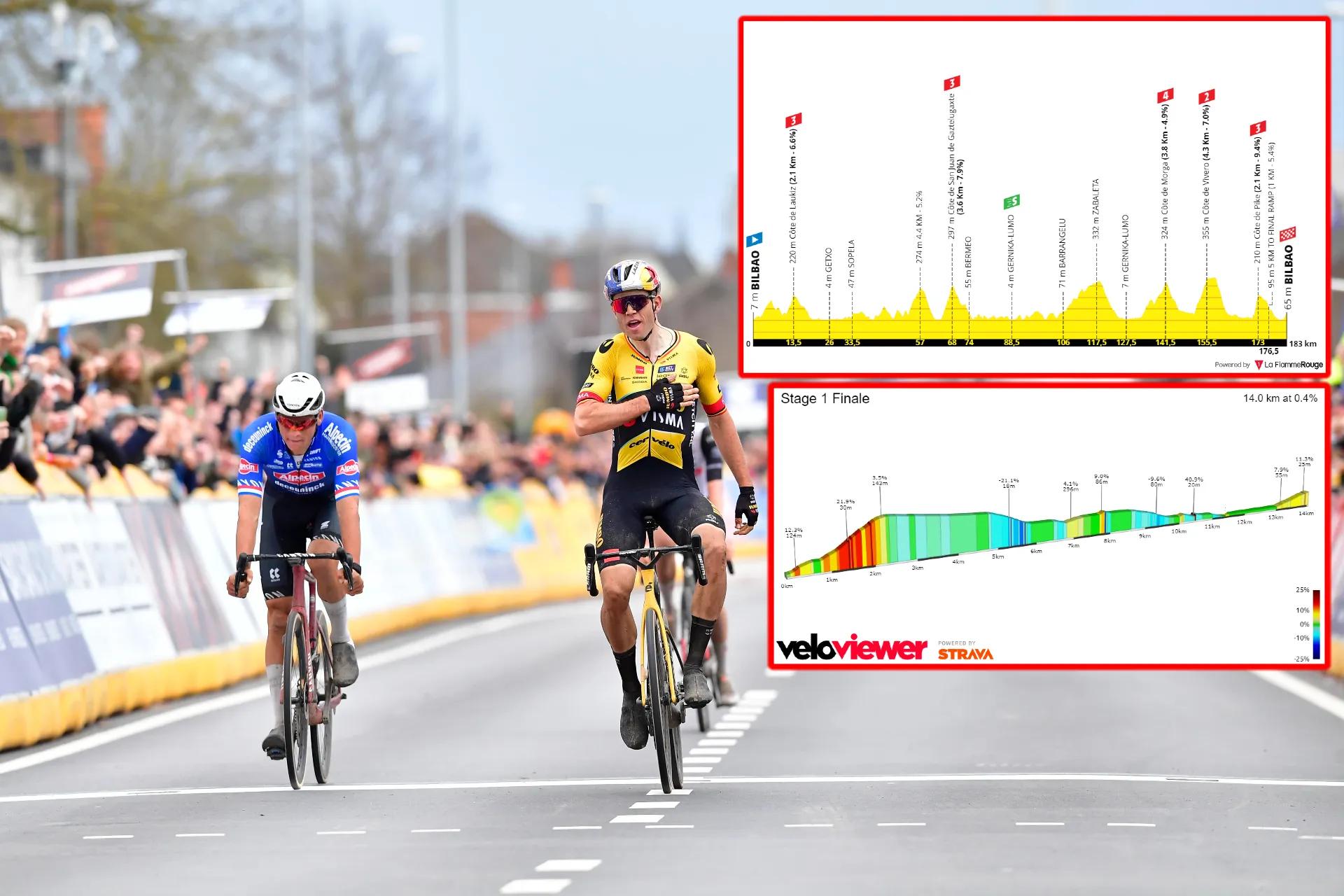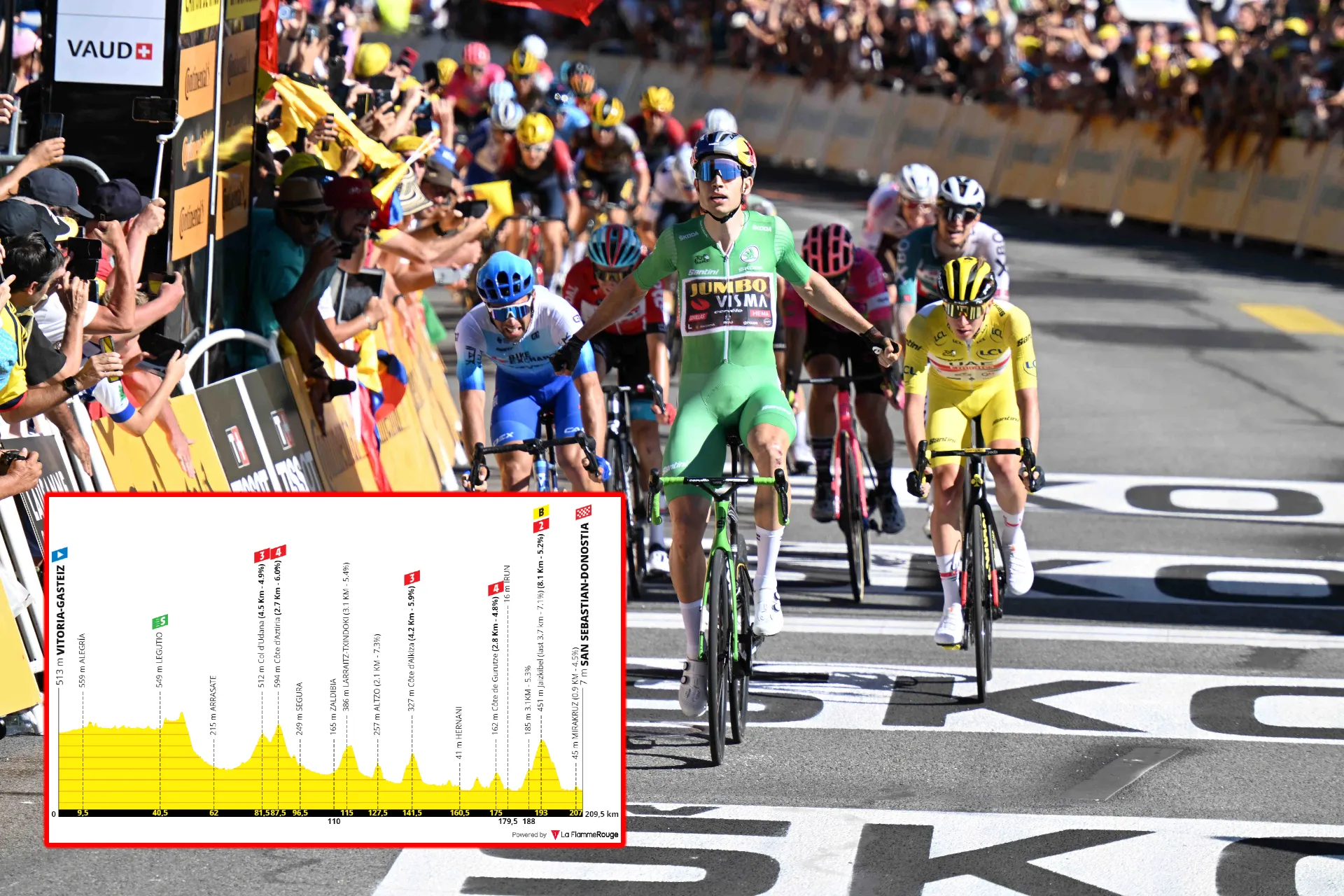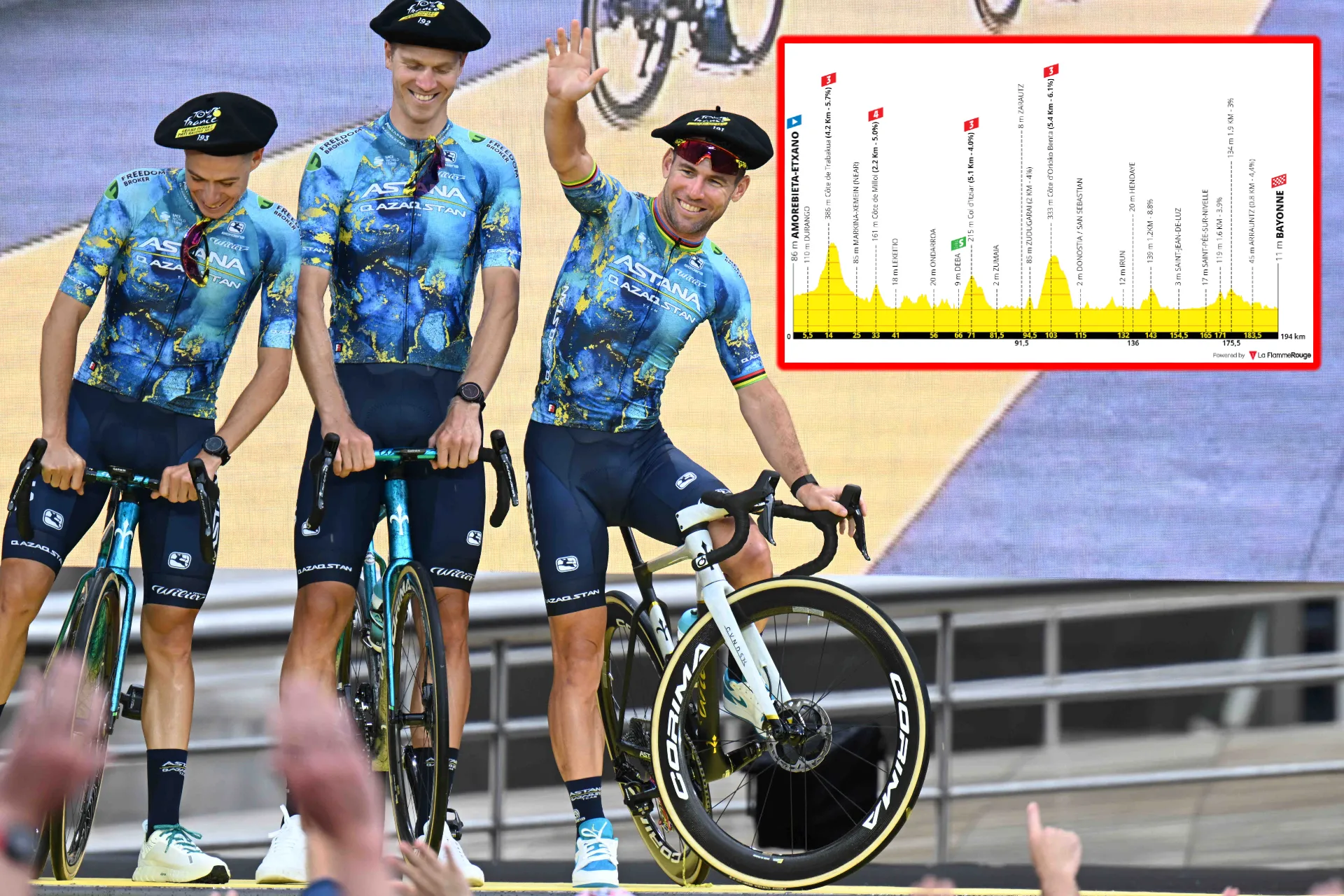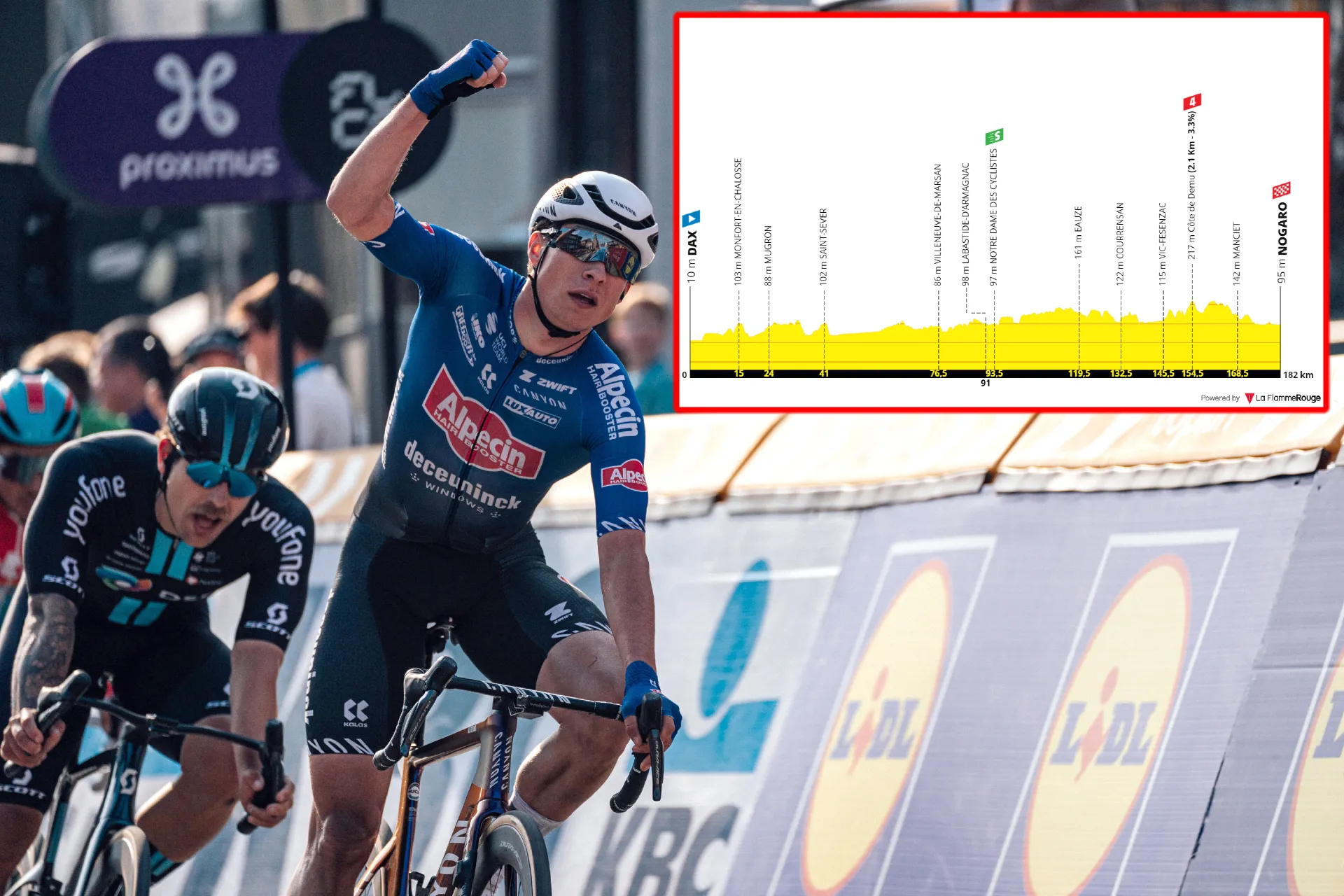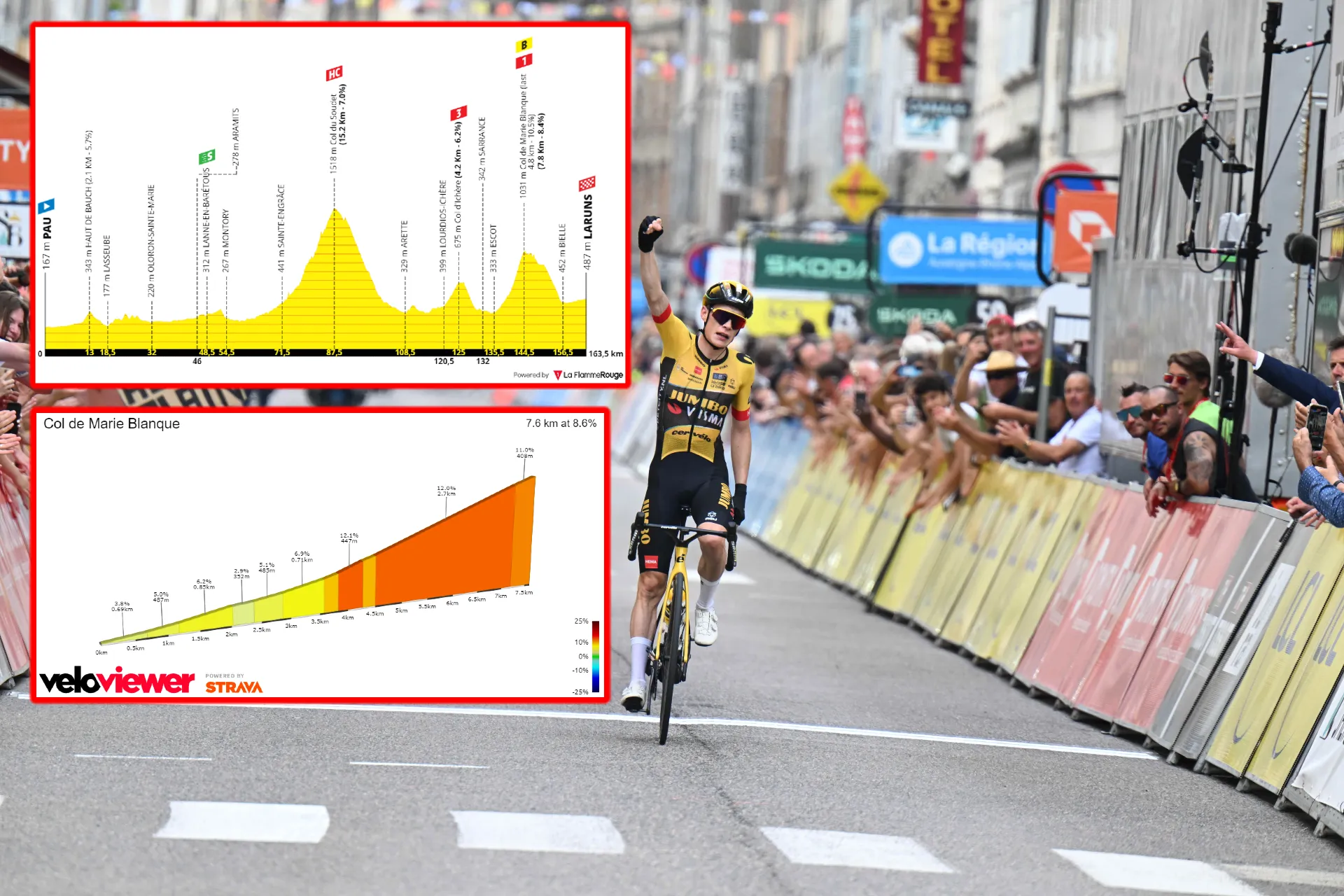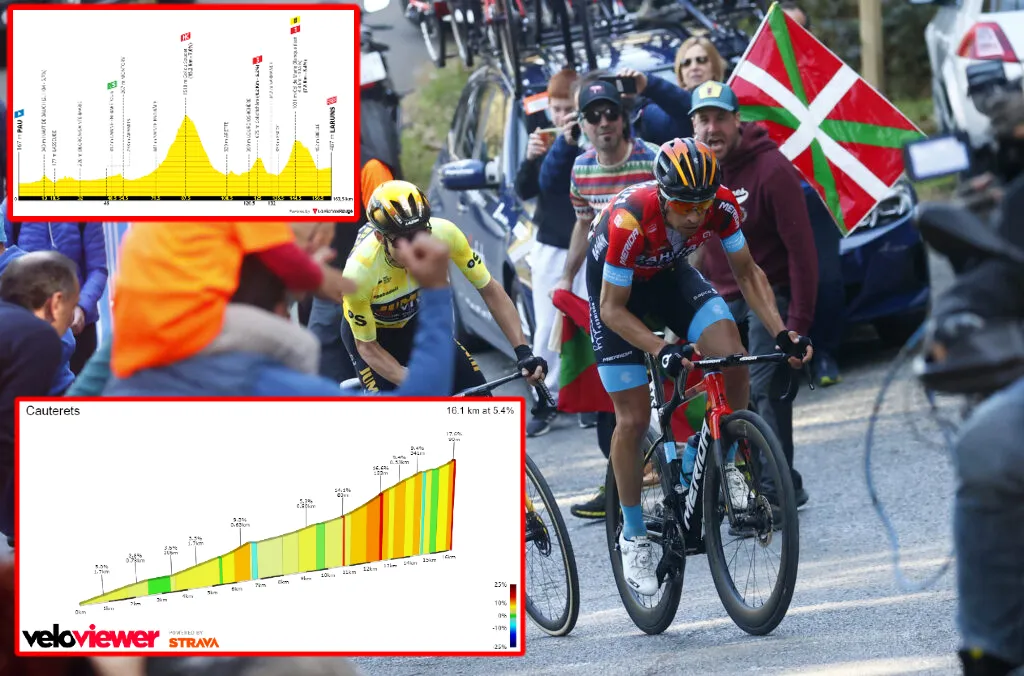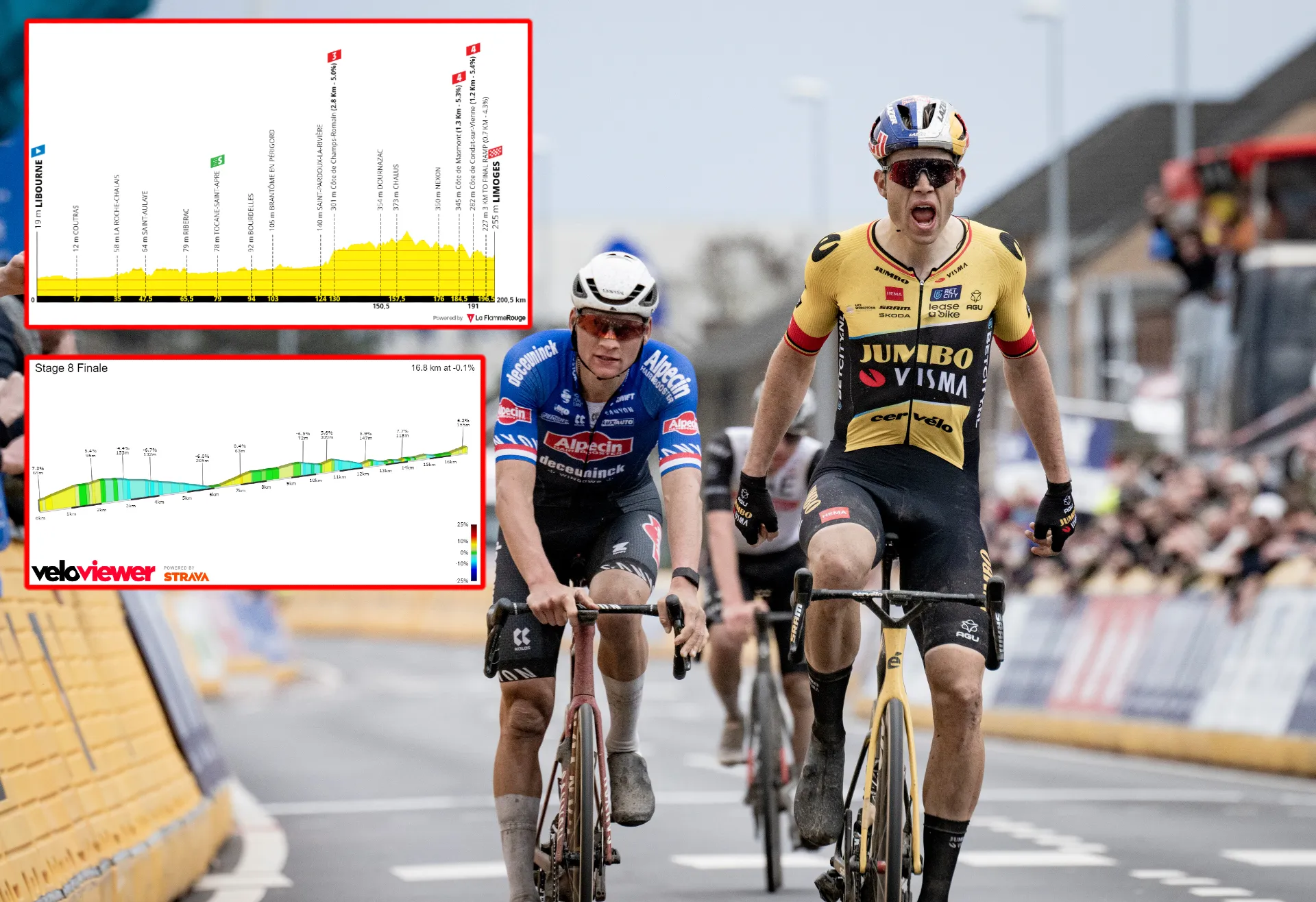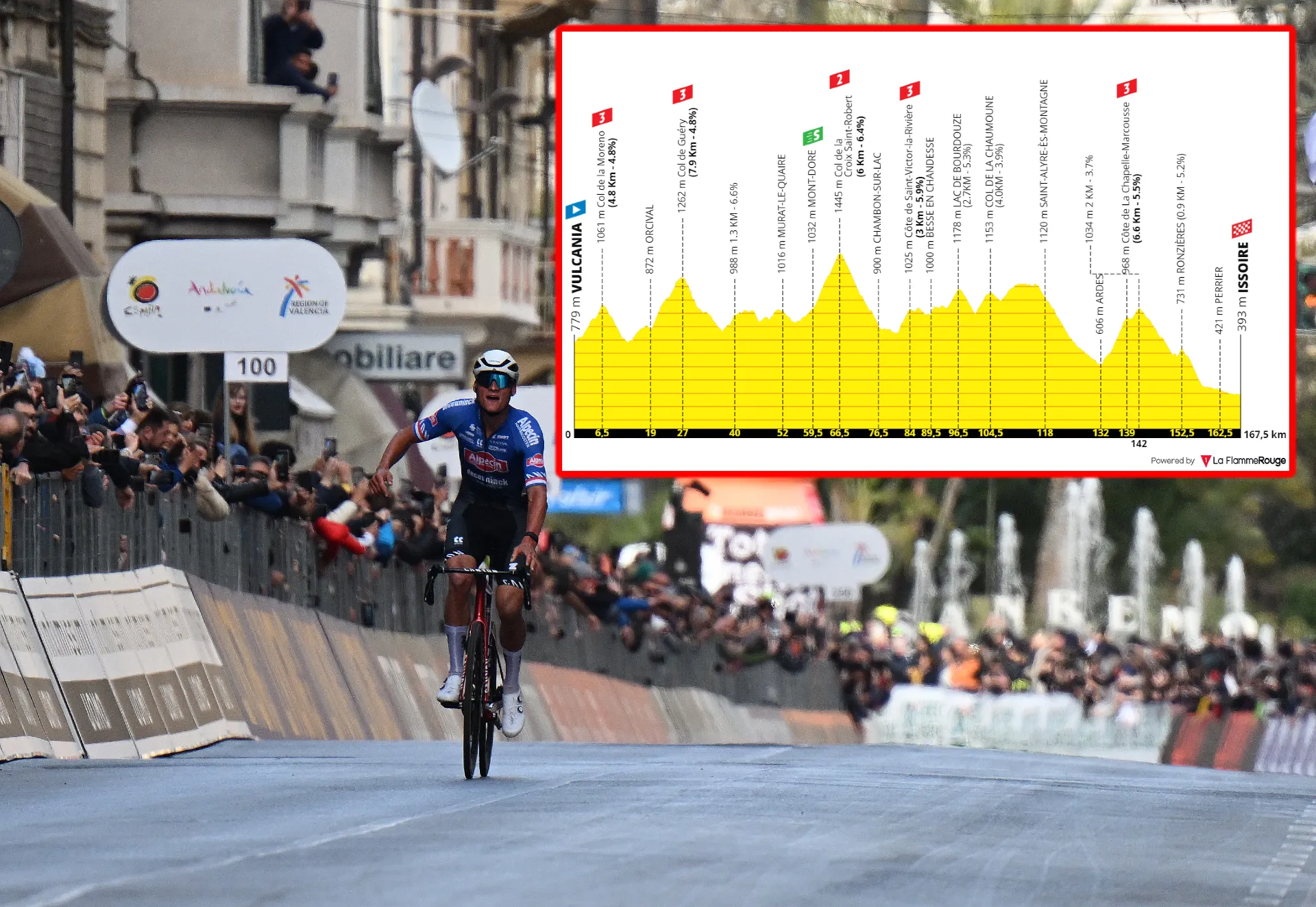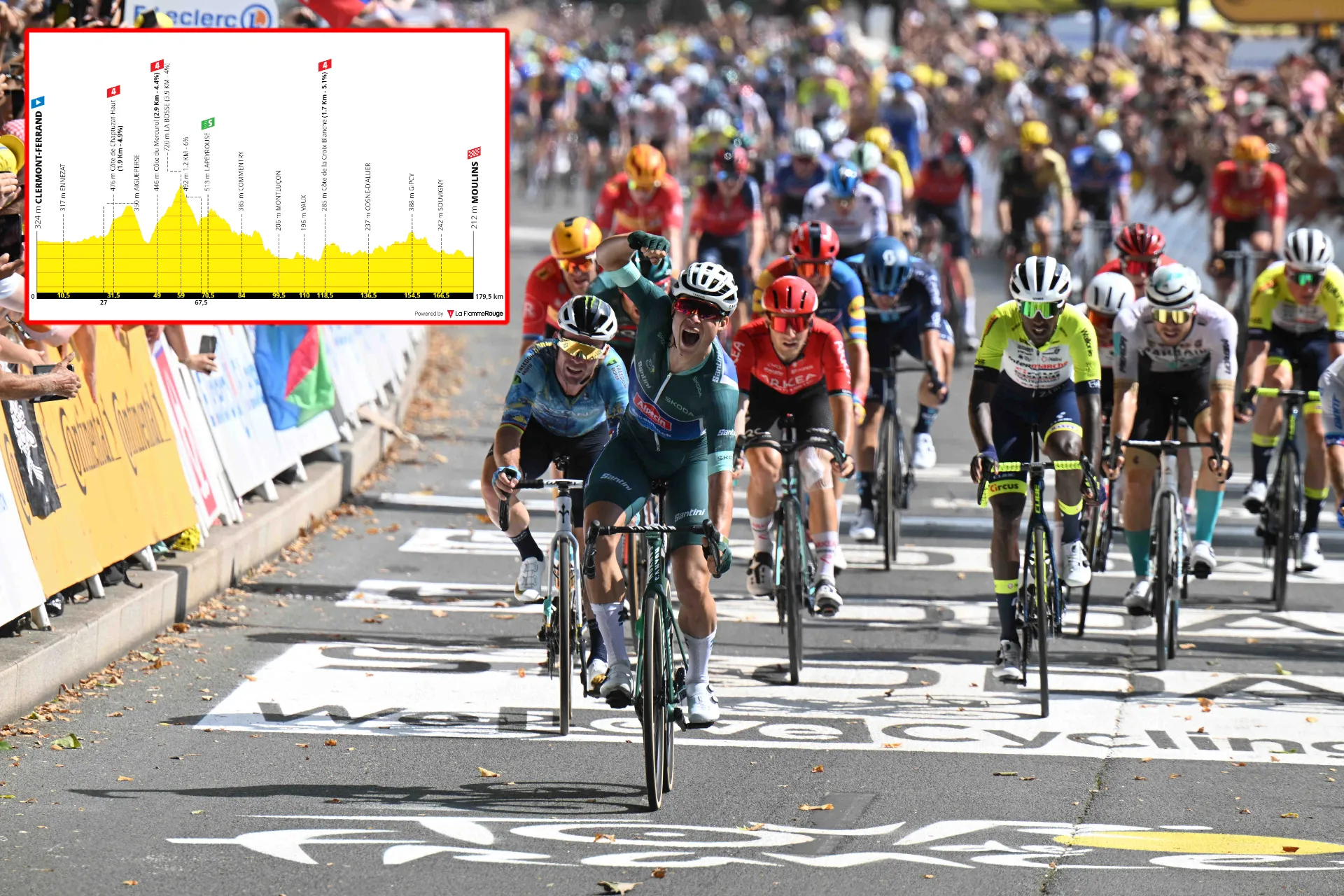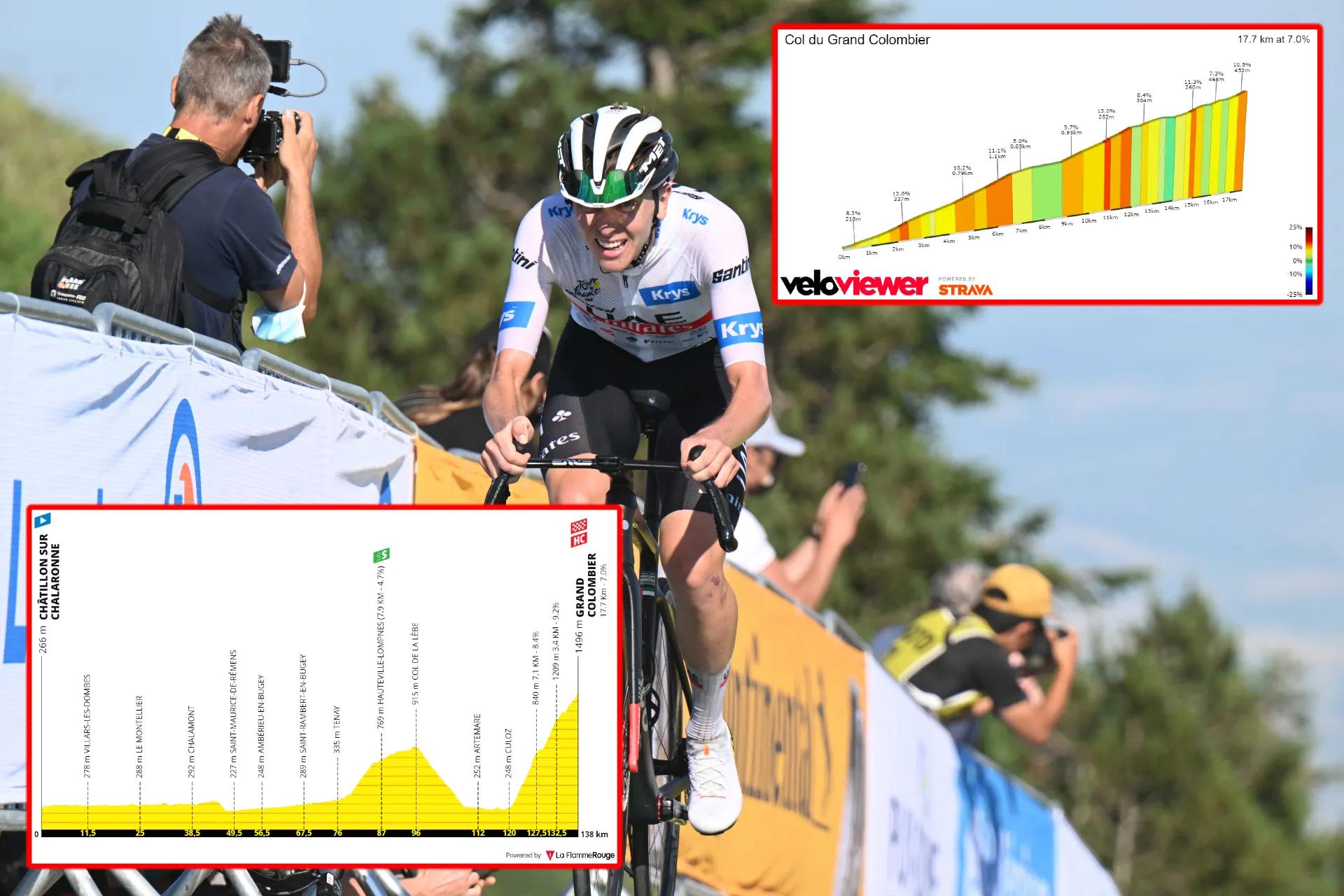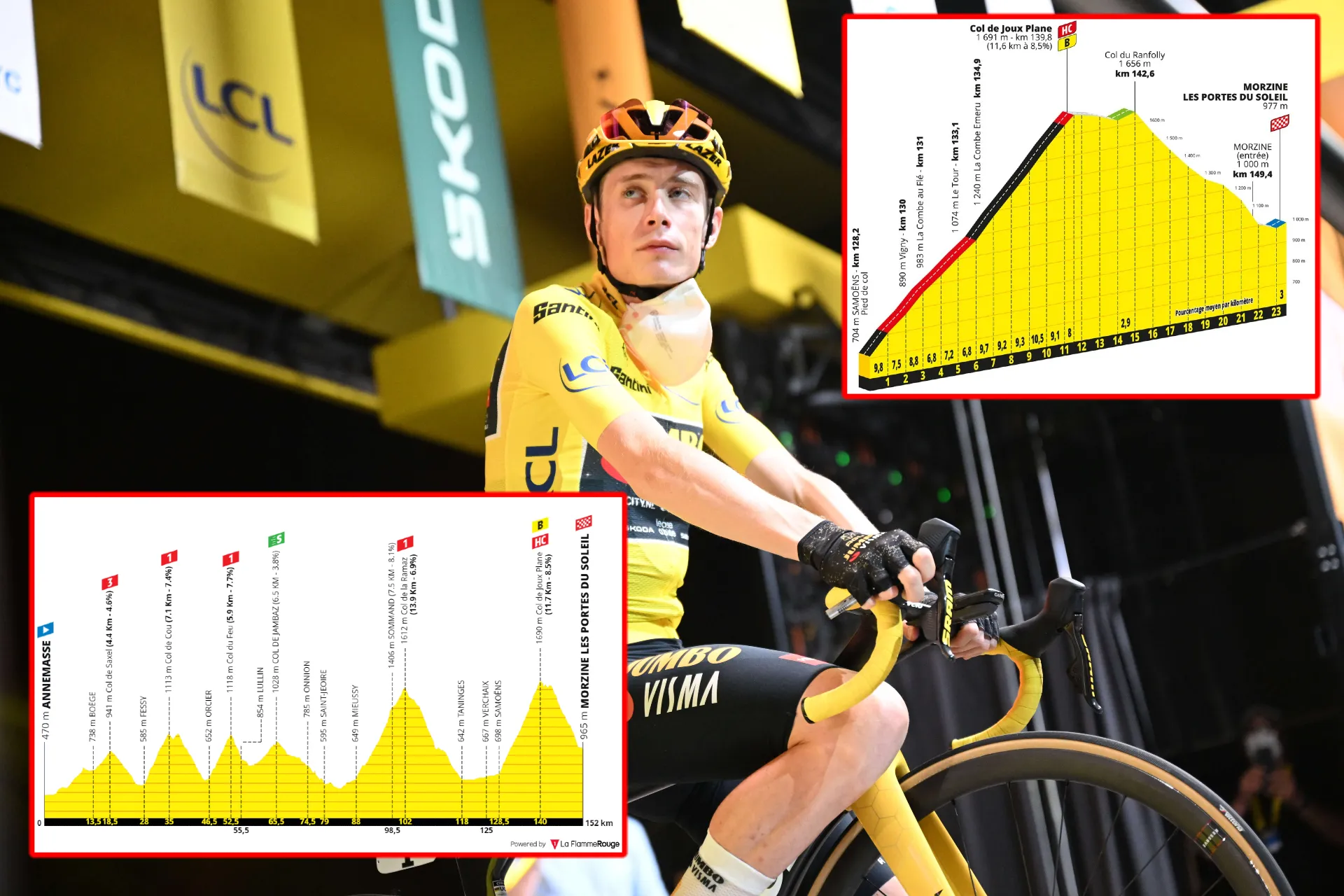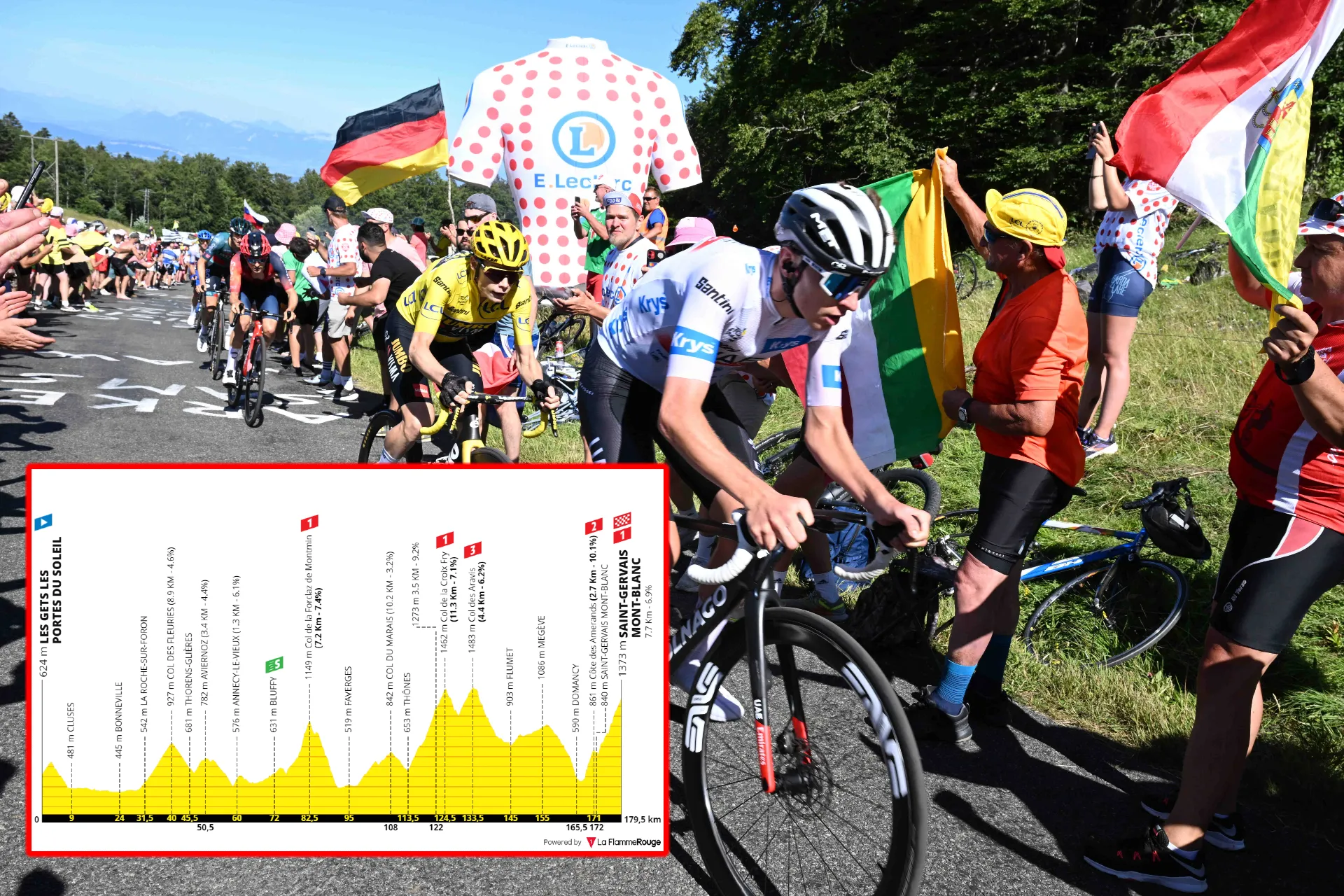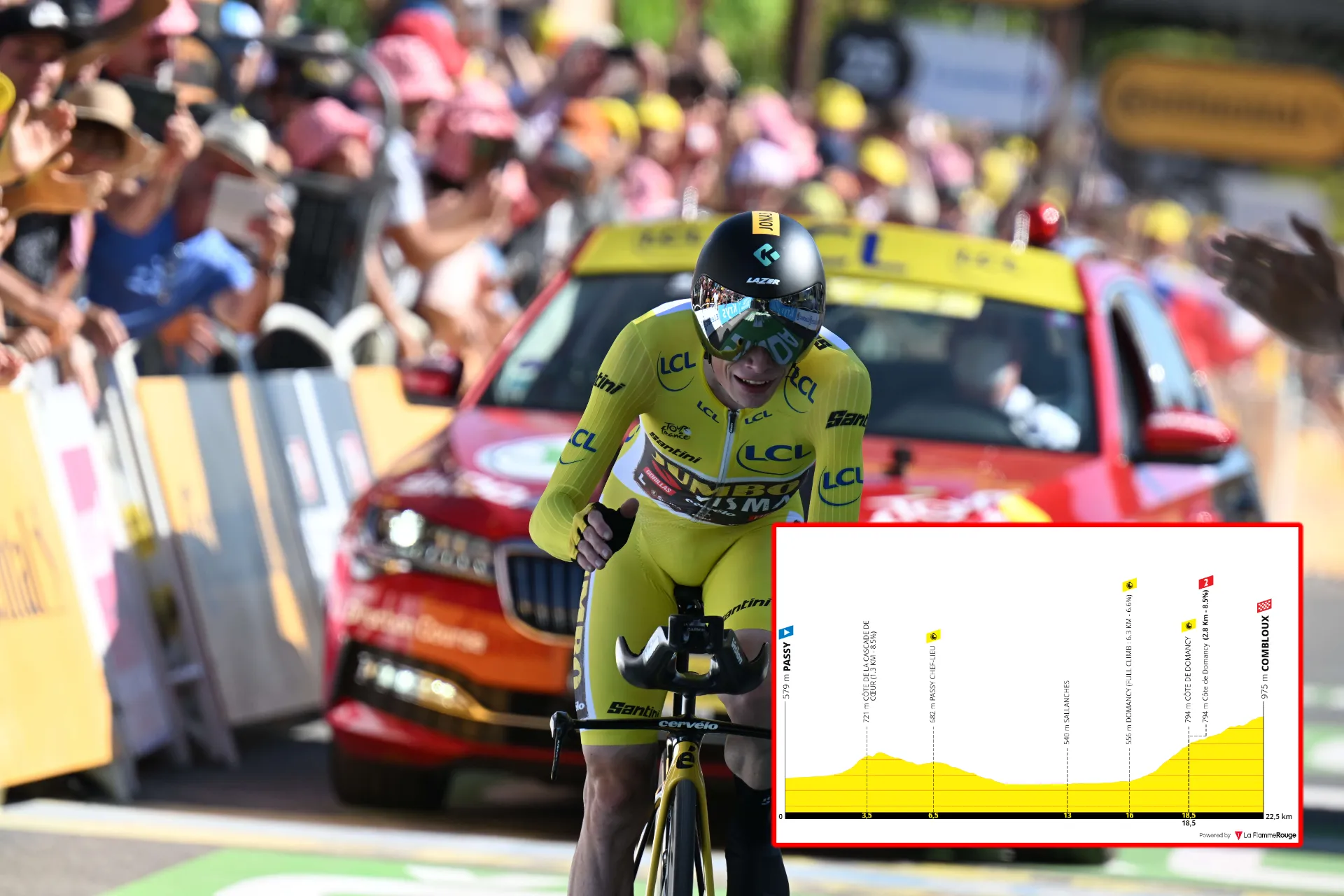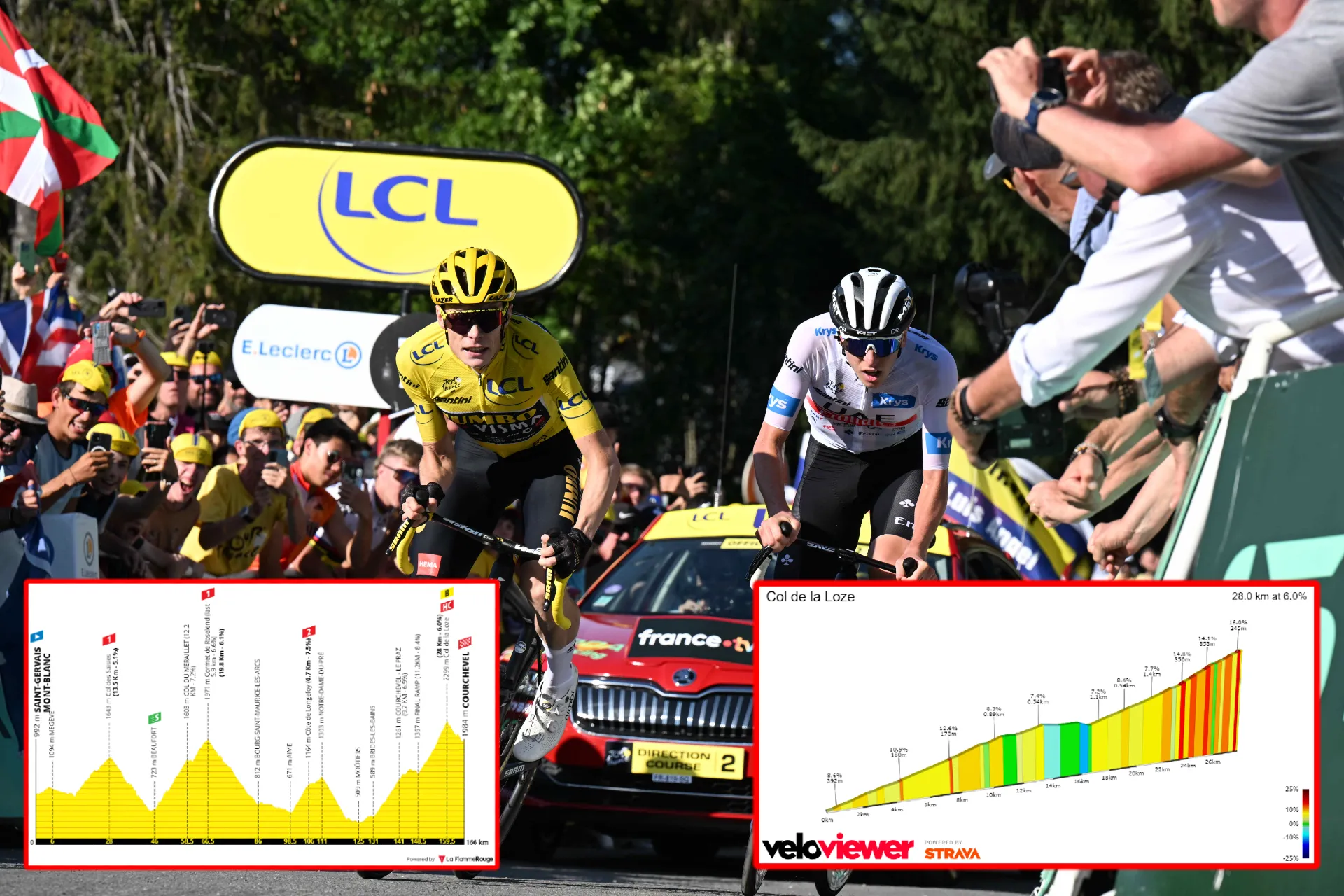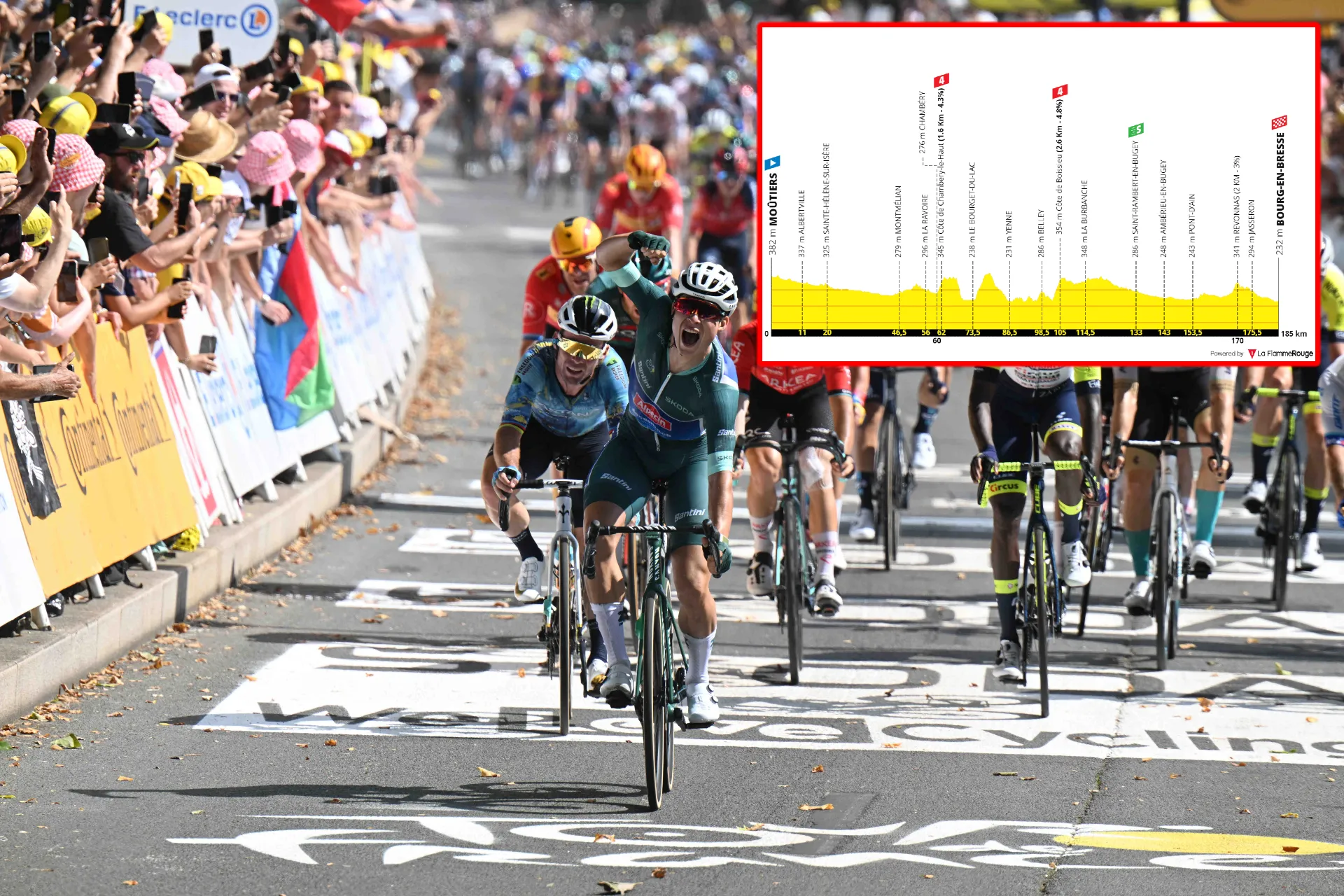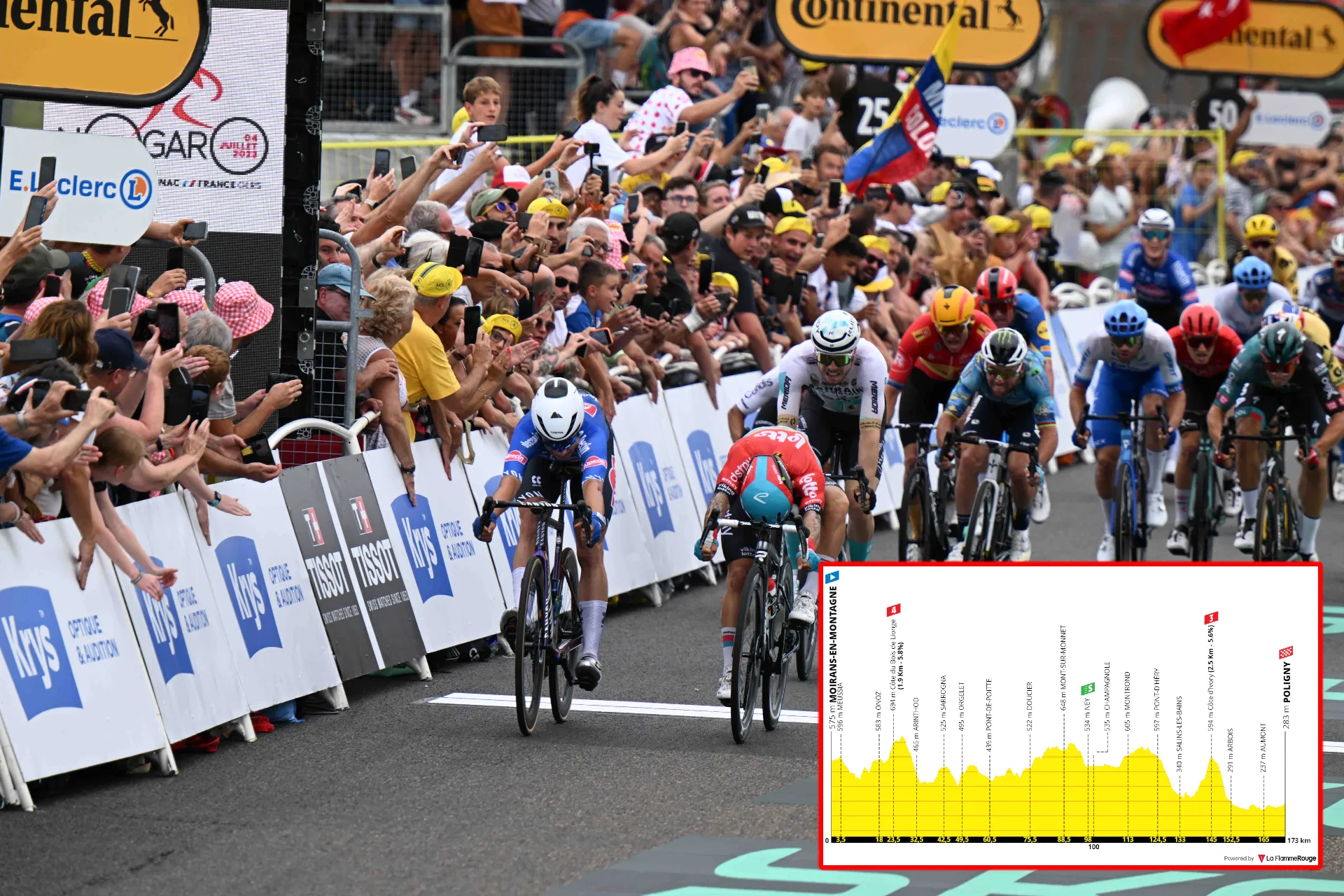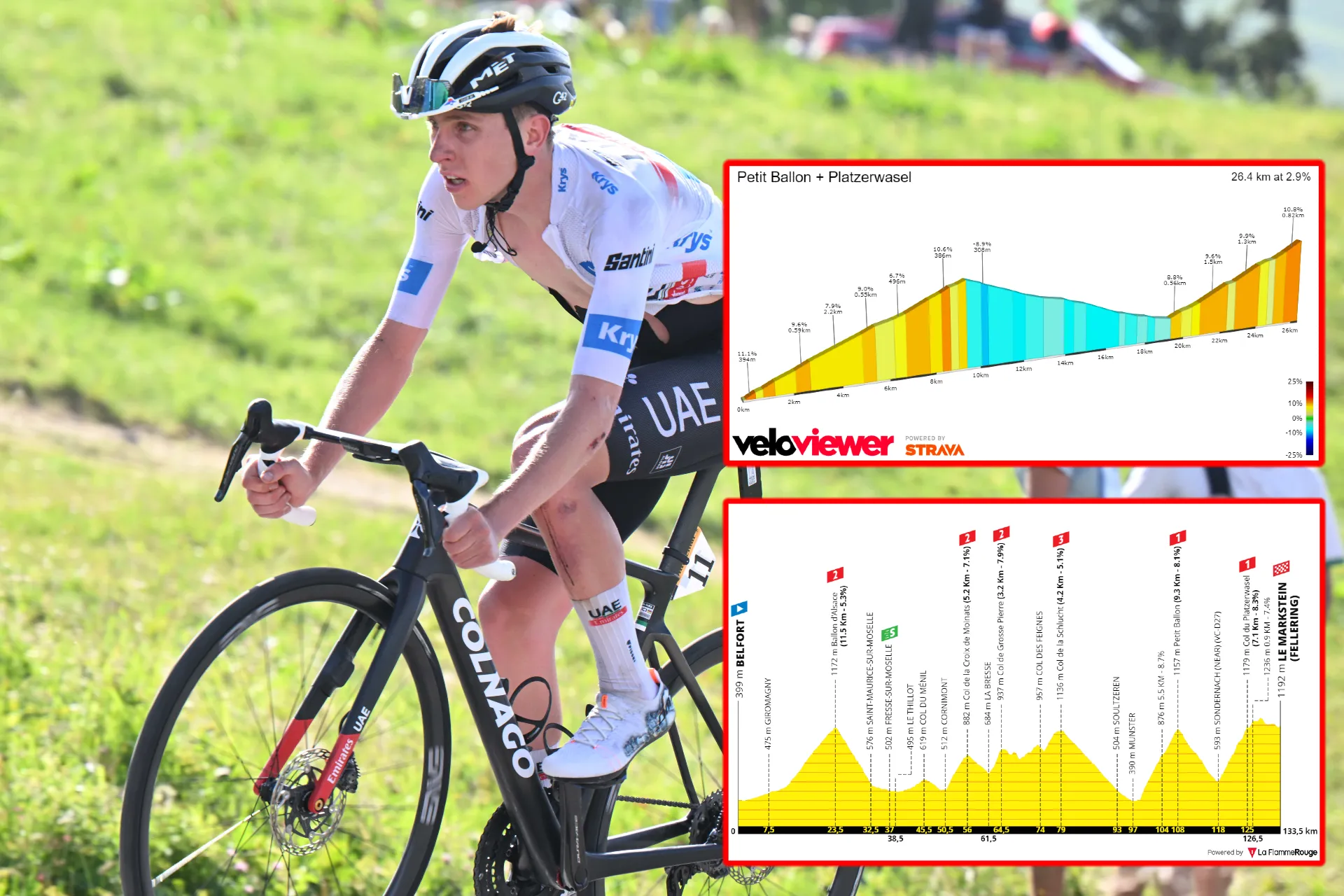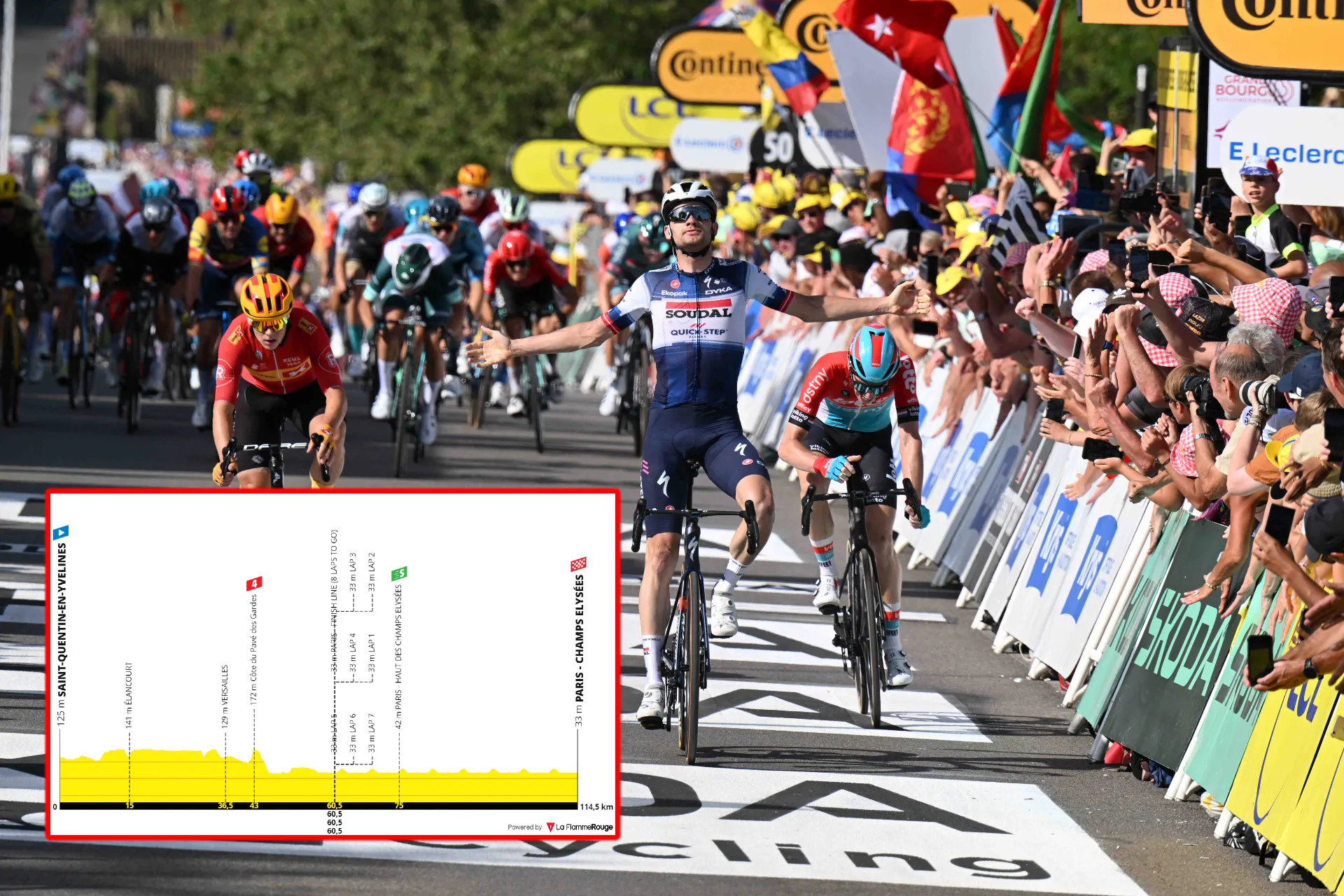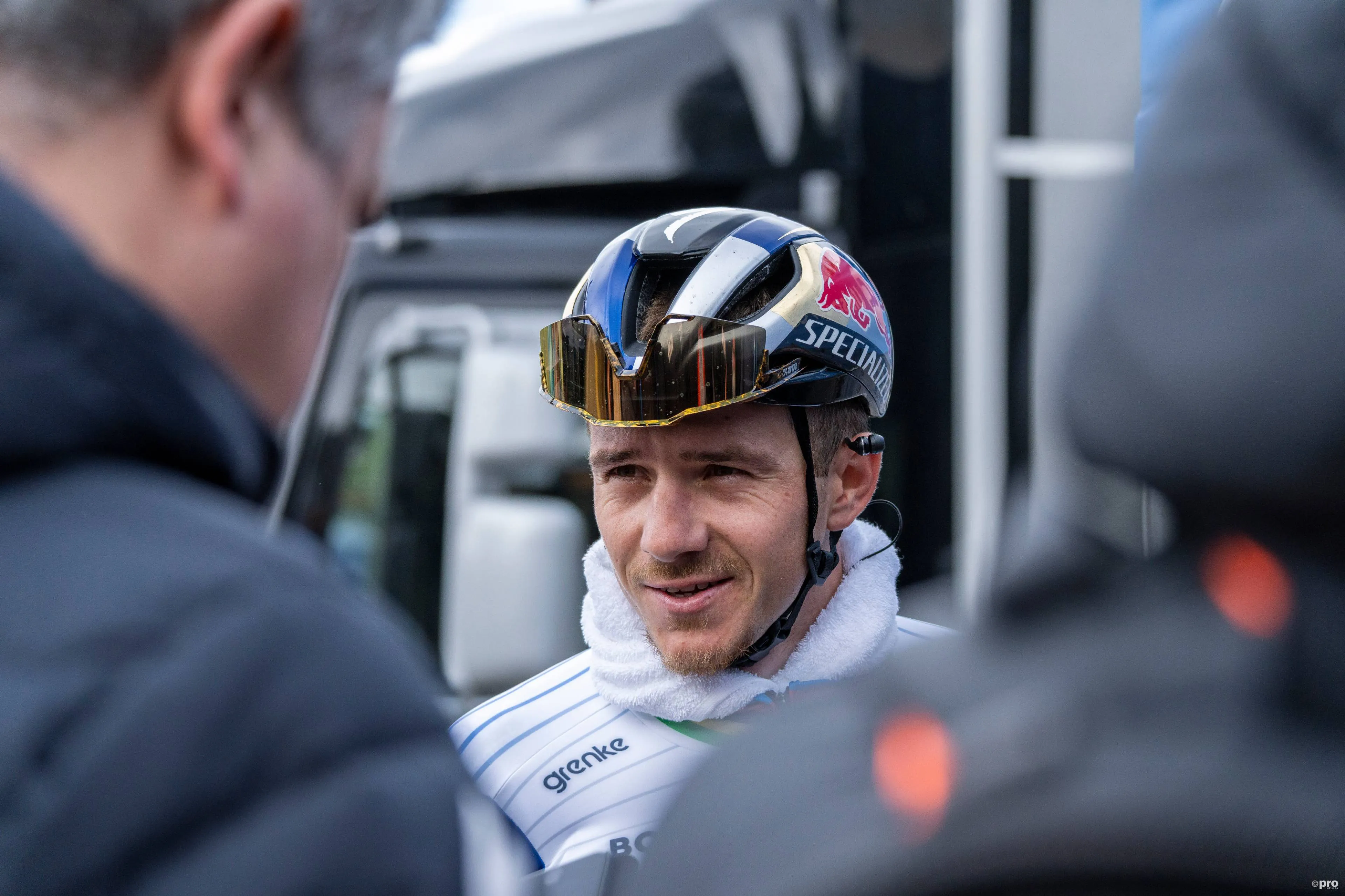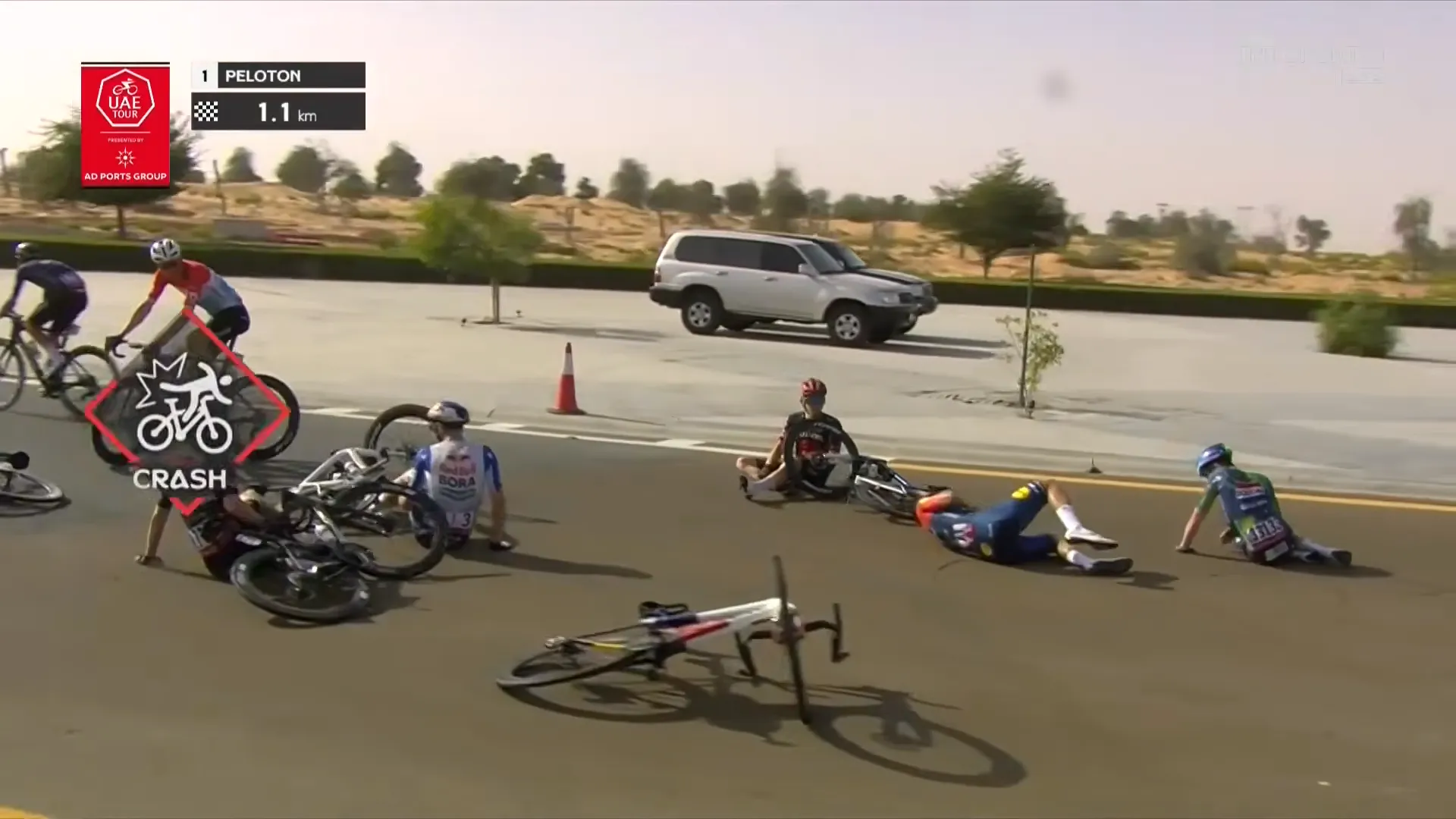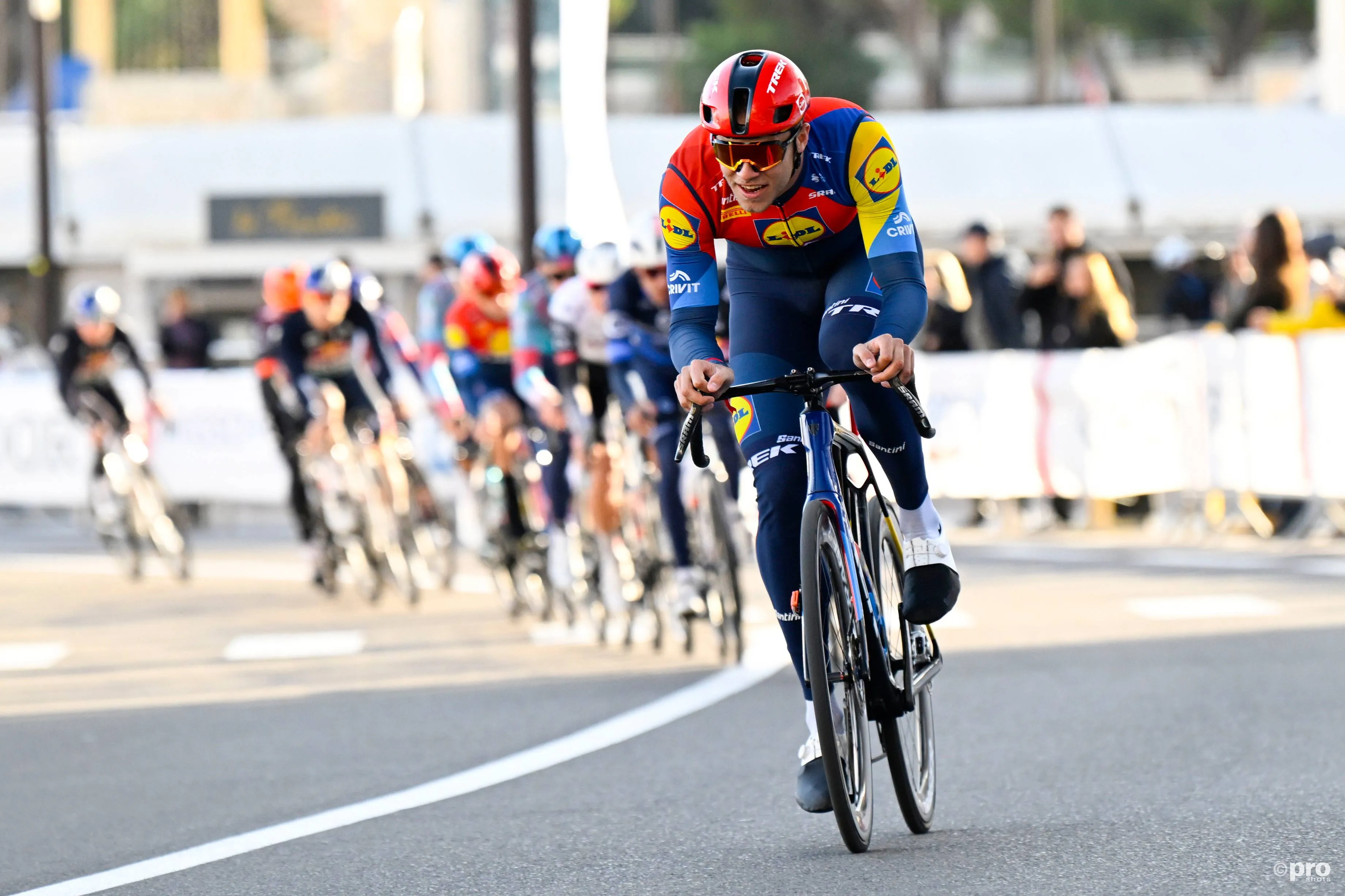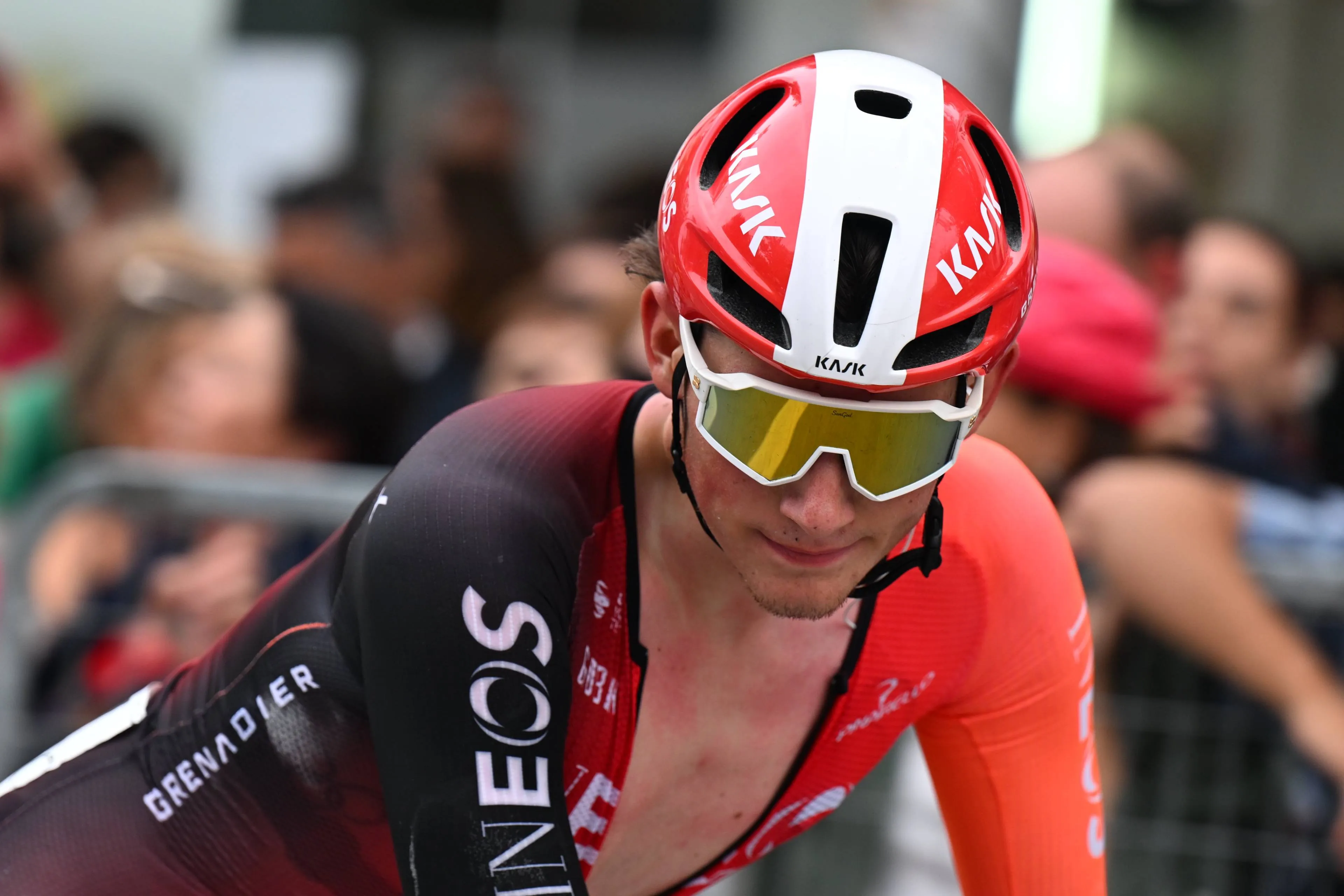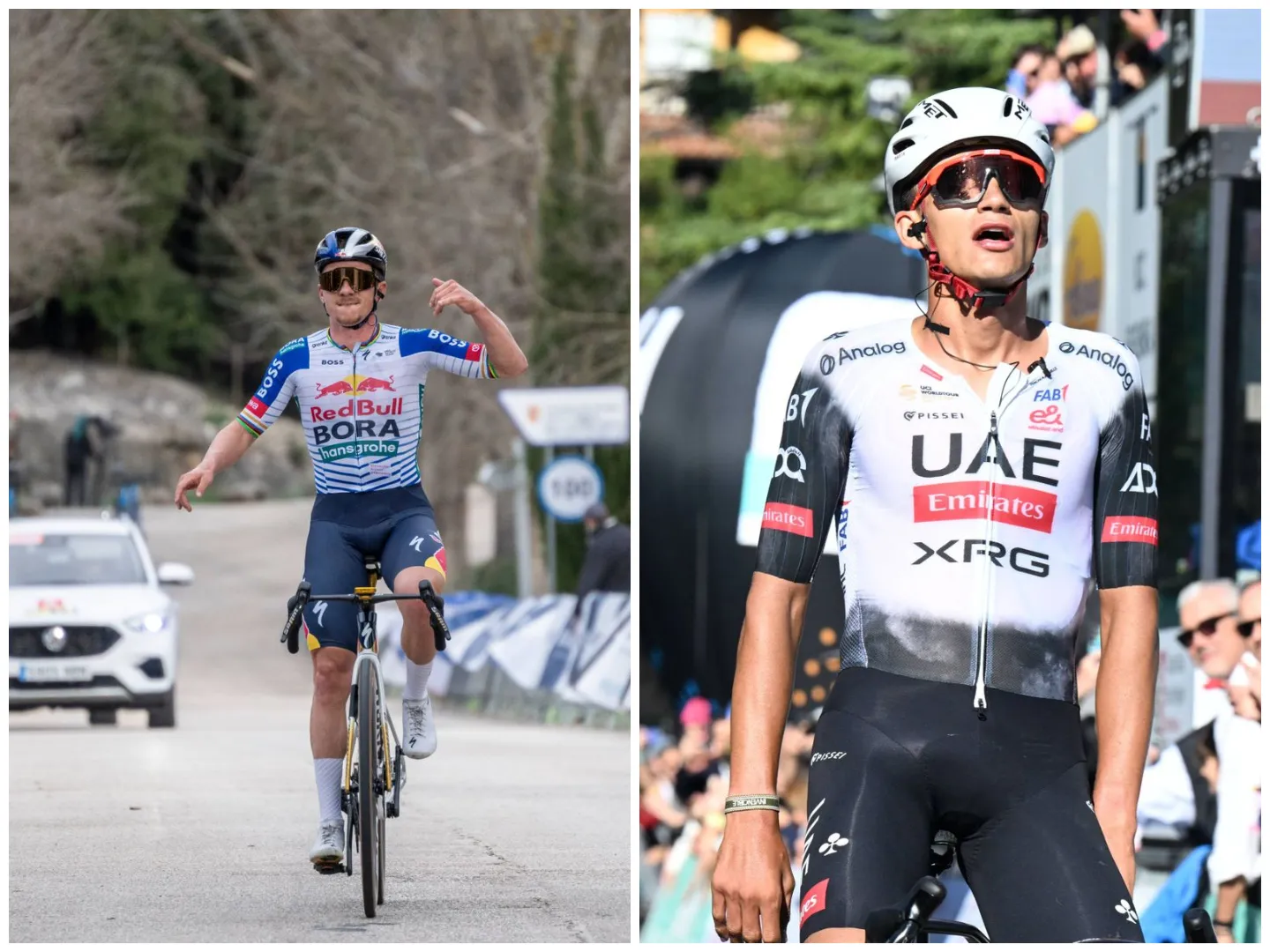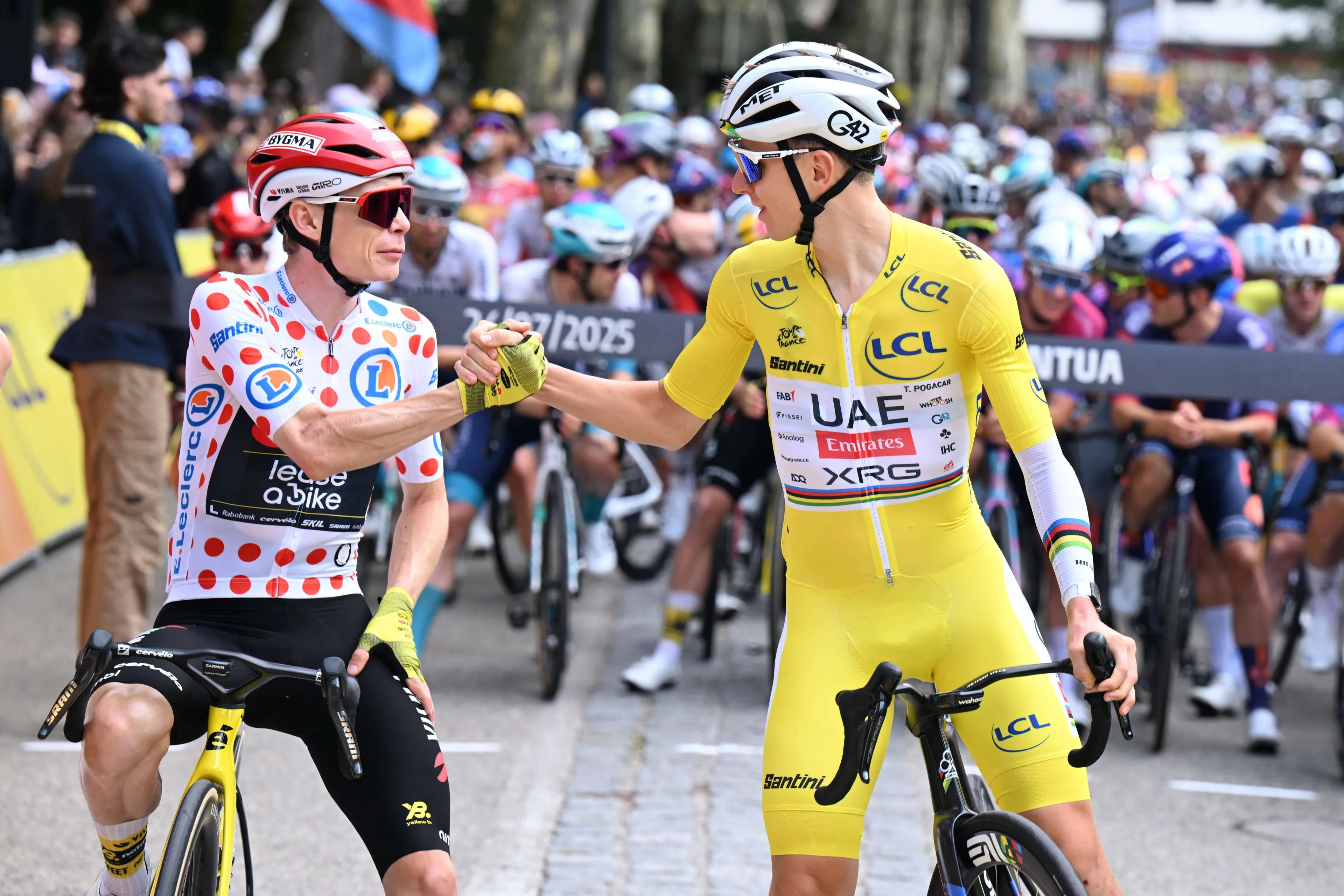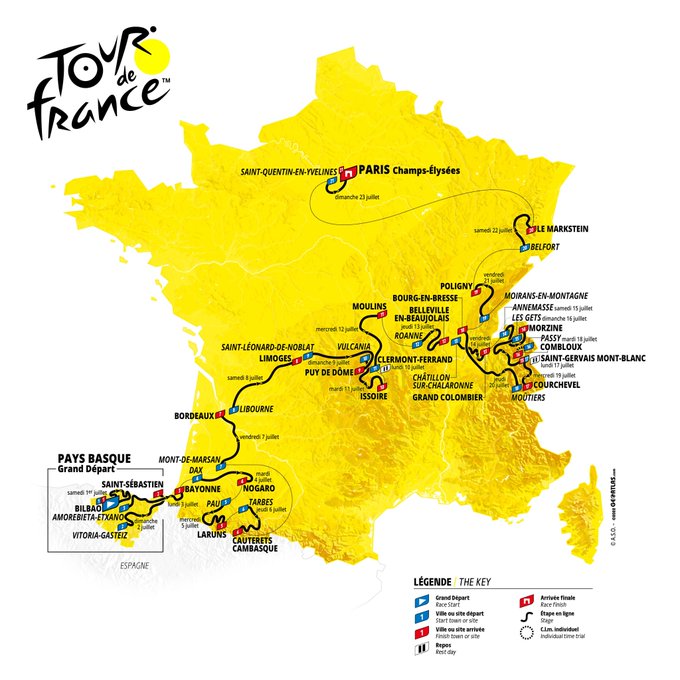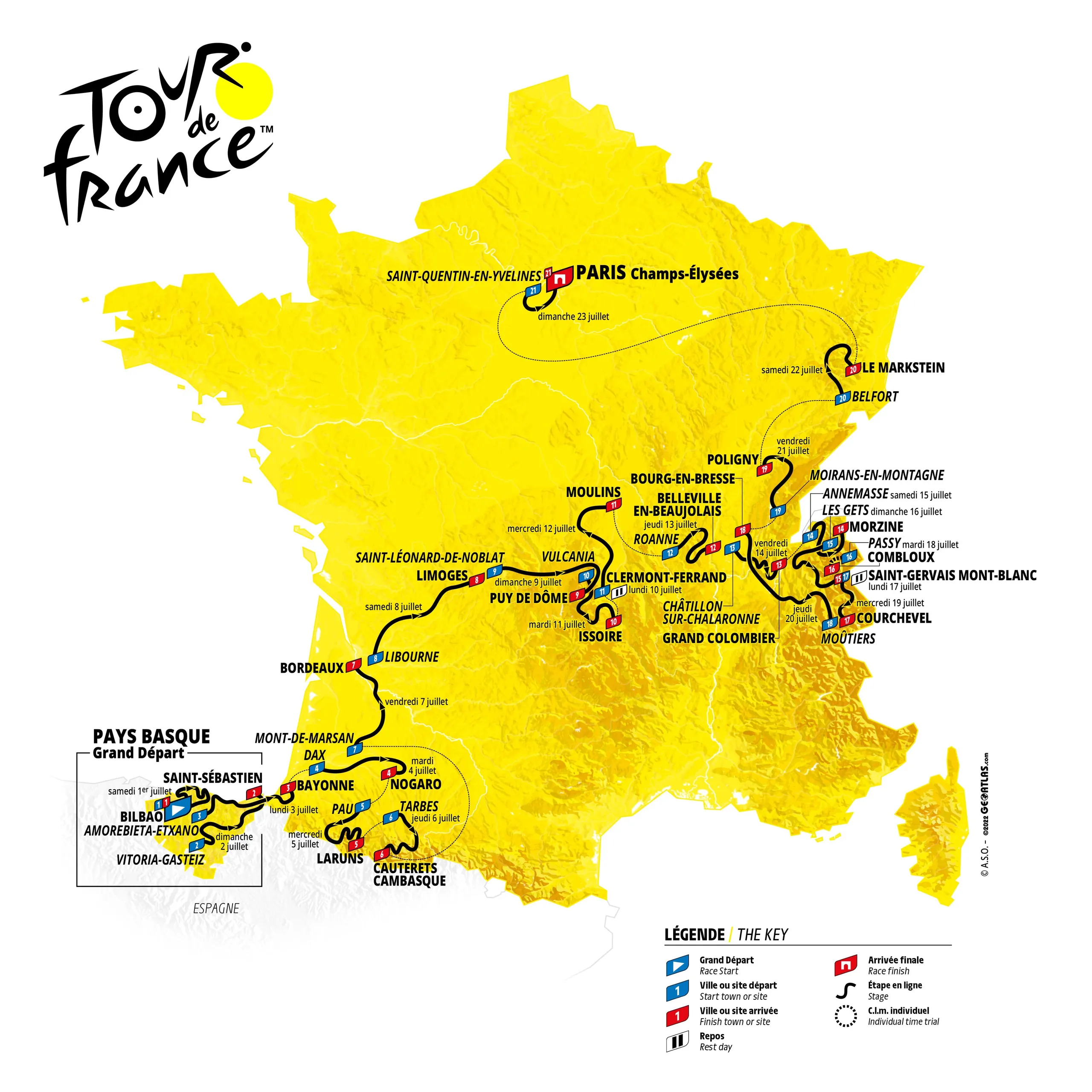
Profiles. The 2023 Tour de France will take place from the 1st to the 23rd of July 2023 and will be the 110th edition of the Grand Boucle. A race starting the Basque Country in Spain, it will see another set of masterful performances and show across the three weeks in what many term as the climax of the cycling season! This article will be updated with the profiles and description of the route and all stages.
The official stages of the race have been revealed with start and finishing locations. It will see the Grand Depart in the Basque Country with two hilly stages with finales in Bilbao and San Sebastián. The race will travel into France from it's southwest corner, and straight into the Pyrenees for two high-mountain stages on days 5 and 6 with finales in Lauruns and the Cauterets.
Read also
The race will then head north with an expected sprint finish in Bordeaux, and a hilly stage into Limoges. The final day of the first week, on stage 9, will see the return of the famous Puy de Dôme climb, where the riders will find their hardest summit finish to date. The second week starts off with a hilly stage from Vulcania to Issoire. Stage 11 will have an expected sprint finish in Moulins, not too different from the next day with a finale in Belleville-en-Beaujolais.
Stage 13 sees the start of a new race, as the Jura mountains return, and the brutal summit finish to the Grand Colombier will be on the menu. It will be an incredibly difficult second weekend, with stage 14 having a downhill finale in Morzine after the tough ascent of the Col de Joux-Plane, and stage 15 will have a summit finish at Mont-Blanc Saint-Gervais with steep gradients and explosive terrain making it a decisive day for the overall classification.
Read also
Stage 16, which opens up the third week of the race, is the only time-trial of the race. It is a 22-kilometer challenge that is fit for the climbers, as it will see two ascents including the famous Côte de Domancy before a finale in Combloux. Stage 17 may be termed as the queen stage, seeing a colossal mountain stage and a finale at the Courchevel Altiport following the ascent of the Col de la Loze.
Stages 18 and 19 will then be transitional days with finales in Bourg-en-Bresse and Poligny. Stage 20 will be the final mountain stage, in the Vosges, as the peloton tackle an explosive but very complicated climbing day en route to Le Markstein after a tough final combo of the Petit Ballon and the Col de Platzerwasel.
STAGES:
Stage 1: Bilbao - Bilbao, 183.1 kilometers
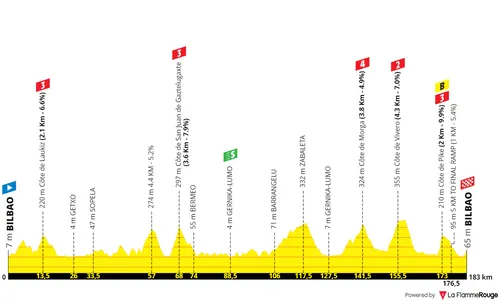
Stage 1: Bilbao - Bilbao, 183.1 kilometers
The Tour de France will start on one of cycling's sacred lands, the Basque Country. The opening day will have 183 kilometers in length and suit the puncheurs, and of course the climbers. It will be a day where the overall classification can be played, a different scenario to a Tour de France Grand Depart.
There are 3200 meters in altitude gain on this day, with a few hilltops right from the start. An interesting start to the day, which features five different categorized climbs. Over the second half the stage will have four ascents, those will be to Zabaleta, the Côte de Morga (3.8Km; 4.8%; 41.5Km to go) and the famous Alto de Vivero (4.3Km; 7.9%; 27.5Km to go) which will warm things up for the finale.
The decisive moment of the stage will be with no doubt the Côte de Pike. It is 2 kilometers long at 9,9%, a true Basque climb where the gradients go into 20%, expect massive and loud crowds all the way into the summit which is placed 10 kilometers to go - with bonus seconds at the top certain to make the race explode. The riders then have a slight descent back into the center of Bilbao, and later on the final kilometers has a 5.4% gradient, definitely a finale which will give the climbers better chances of succeeding. The first yellow jersey will be at hand in the finish line likely.
Read also
Stage 2: Vitoria-Gasteiz - Donostia San Sebastián, 210.1 kilometers

Stage 2: Vitoria-Gasteiz - Donostia San Sebastián, 210.1 kilometers
The second day of racing at the Tour de France won't be too different, only this time with a finale in Donostian San Sebastián. The decisive climbs of the Clasica San Sebastián won't be ridden, however the Jaizkibel will and will also be positioned relatively close to the finish. A more open second day, where climbers, puncheurs, rouleurs and sprinters all have a chance of succeeding.
A more flat start, however throughout the day there will be four categorized ascents - and a few others - before the main ascent of the day, which is likely to make it a bit more difficult for the sprinters. However that will be if the pace is pushed, otherwise most riders will get through comfortably. With 36.5 kilometers to go there is the Côte de Gurutze which is 2.5 kilometers at 5%, but then comes the biggest moment of the race.
Featuring 7.9 kilometers at 5.2%, it is a respectful climb, ridden in the opposite direction of what the riders face in the Clásica. A small 1 kilometer slight descent makes it a climb of two halves too, the final 3.7Km have 7.1% gradient. In all honesty, the climb will likely see minimum of 20 or 30 riders if the pace is pushed quite hard, but this is unlikely. A peloton of around 50 riders is expected, perhaps some can come back in the final descent.
The descent has a few technical sections, the climb ends with 16.5 kilometers to go and then the final 9 kilometers are flat. There is time to organize, there is also time to attack. There are few corners from there on all the way into the finish. With 3 kilometers to go comes a small rise which is 900 meters long at 4% which provides another spot to attack, but then the finishing straight will be flat.
Read also
Stage 3: Amorebieta-Etzano - Bayonne, 188.7 kilometers
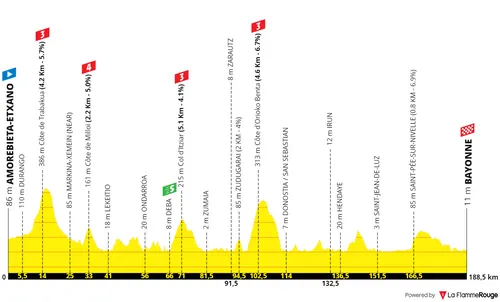
Stage 3: Amorebieta-Etzano - Bayonne, 188.7 kilometers
Stage 3 of the Tour de France will be the first for the pure sprinters, although it won't be a completely flat run-in into France and the coastal city of Bayonne. The start isn't the same however, starting in the Basque Country the riders face a 4.2 kilometers climb at 5.7% in the opening kilometers. The first half of the day features quite a few ascents, 4 categorized, making for a tricky day if some teams think of spinning a high gear there.
However it's unlikely that there will be teams spending bullets there purely for fatigue, as there won't be an alliance of many teams going all out for the last 102 kilometers. From there on it's a bit easier for the fast men, the final hilltop then comes with 20 kilometers to go, 3.3 kilometers at 4%. There is a slight chance the pace may be pushed there, but most likely the gradients aren't hard enough to drop anyone.
The riders then ride quickly into Bayonne for the first finale on French territory. It will be a tense finale with a roundabout coming with 2.4 kilometers and a long 180-defree corner just before 2Km to go, and then a sharp rise with a 200-meter ramp, followed by a small descent and slight corner into the final kilometer. There are a few moments to recover position still, the finale will be flat but with a slight left corner with 200 meters to go will make for a specific fight for position on the left side.
Read also
Stage 4: Daz - Nogaro, 181.2 kilometers

Stage 4: Dax - Nogaro, 181.2 kilometers
Stage 4 of the Tour de France will see the race head east. It will be a pure sprinter day from Dax to Nogaro, with no real difficulties, where the fast men will test themselves. It's a rather uneventful day profile wise, mostly a transition day through southern France.
The roads into Nogaro are open, non-technical and mostly with a regular flat tone. The finale won't be on public roads however, the riders enter the Circuit Paul Armagnac. You could say the finale is really technical looking at the map however this is a motorsport track, the roads are incredibly wide and the corners slight, there won't be breaking. It will be an interesting one to watch, the finishing straight will be 650 meters long and pan-flat.
Read also
Stage 5: Pau - Lauruns, 163.8 kilometers
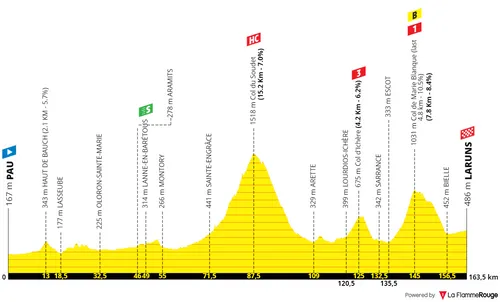
Stage 5: Pau - Lauruns, 163.8 kilometers
Stage 5 of the Tour de France from Pau to Lauruns will be the first high mountain day, in the Pyrenees. The Tour has opted for a different formula this year, a route for the pure climbers. Stages 5 and 6 will be a tough challenge with real mountains. As is always the case at the Tour, the start of a Pyrenean stage is flat, coming from the city of Pau which never misses the race.
Whilst usually the first mountain stage at the Tour is blocked, it should not be the case here, as the stage will feature the tough Col de Soudet (15.1Km; 7.2%). A very hard climb, it summits with 76 kilometers to go, the pace won't likely be pushed too much but nevertheless, with this toughness the peloton could lose a few riders.
After a long descent the riders find the Col d'Ichère as a transition, it's 4.2 kilometers long at 6.2% and will summit with 38.5 kilometers to go. A small - but technical - descent will lead into the Col de Marie Blanque.
This is the same finale as in 2020. The Col de Marie Blanque is a climb of two halves, very constant and a progressive rise of gradients. The final 4.8 kilometers average 10.5%, with only one hairpin. The first day in the mountains of a Grand Tour are usually very conservative, but on a climb like this differences can be made. The ramps are brutal, it's not a climb for big accelerations, but a tough pace will decimate the group.
The climb ends with 18.5 kilometers to go, and the descent will be quite technical, 11.5 kilometers long. Then the final 7 kilometers will be flat, there is time to close gaps, unlikely that gaps can be opened with serious damage, but as was the case in 2020 where Tadej Pogacar won his first Tour stage, it could be decided in a small group sprint.
Read also
Stage 6: Tarbes - Cauterets Cambasque, 145.4 kilometers
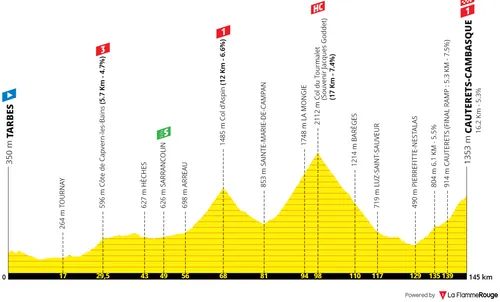
Stage 6: Tarbes - Cauterets-Cambasque, 145.4 kilometers
The second day in the Pyrenees at the Tour de France will see some more famous climbs on the menu. Perhaps a classical day, with plenty difficult climbs where differences can be made, but it will be all about the riders' attitudes. A short 145 kilometers with a flat start makes for an easy start to the day, the last 100 kilometers will be the ones where most of the action is expected.
That will start with the Col d'Aspin. It's 12 kilometers long at 6.6%, a warm-up for what's to come next, it summits with 77 kilometers to go but after a short the descent the riders are directly at the base of the Col du Tourmalet.
This is the toughest ascent of the day, a Tour classic - at this point, perhaps the most used climb in pro cycling. It will be climbed via Sainte-Marie de Campan it's 17 kilometers at a constant 7.4%, an ascent where the gradients never truly change much, it summits with 47 kilometers to go and the summit is at an altitude of 2112 meters.
After the descent into the valley the destination will be Cauterets-Cambasque, at the end of a very short stage. It will be at the end of a rough day so differences can be made, but with 16 kilometers at 5.4% it is unlikely to be an ascent with many serious moves within a normal race, however every mountain stage is an opportunity. In the final 5 kilometers there are a few ramps over 10% and it could see some action.
Read also
Stage 7: Mont-de-Marsan - Bordeaux, 169.8 kilometers
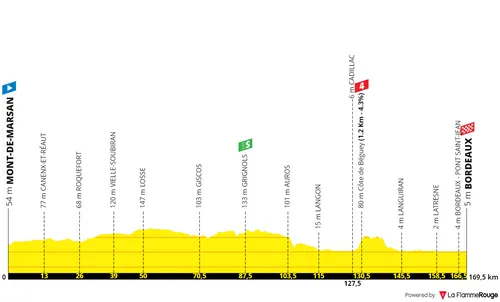
Stage 7: Mont-de-Marsan - Bordeaux, 169.8 kilometers
Stage 7 of the Tour de France sees the riders leave the Pyrenees and start heading north. The metropolitan area of Bordeaux receives the Tour de France back, for a stage that will be perfectly suited to the fast men. The first true transition day as the riders steer away from the mountains.
In all reality there isn't much to analyze from the day, other than a majority of pan-flat country roads which can be exposed to strong winds but there isn't much to it other than that. The riders will put all their attention into the finale.
It's not a technical finale however the riders head into the center of the city, speed and tension will be high among the urban environment. The final kilometers see the riders cross the river, but the final two kilometers will virtually be completely straight, only with a couple of roundabouts to stretch things out before the finish line.
Read also
Stage 8: Libourne - Limoges, 200.9 kilometers

Stage 8: Libourne - Limoges, 200.9 kilometers
Now on stage 8 of the Tour the race moves to the northeast. It's a long day on the bike, one of the very few days that go over 200 kilometers. Another transition day with a pan-flat finale, however it will be a slight different finale.
It will all come down to that final hour of racing. A tough challenge, tension will be high and certainly the GC teams will swarm the front in an attempt to not be caught out, of both splits and possible crashes. The pace will go up, and in the final 50 kilometers there will be plenty small hilltops. It's a very rolling terrain, this is a day for the sprinters, but not a pure sprinter day. Some will be burnt throughout this hour of racing, some teams may push it too purposefully.
There are even two categorized climbs with 16 and 9.5 kilometers to go, they are 1.3Km at 5.3% and 1.2Km at 5.4%. You can tell, they are big-ring climbs, but they will be felt, and with descents inbetween all these hilltops the peloton will find itself in a constant change of speed.
The riders ultimately head into Limoges. It's not a very technical finale, but the challenge here will be the gradients. The riders turn into the finishing straight which is 700 meters long at 4.3%, not a pure sprint and it will spice things up, surely with many to try and surprise.
Read also
Stage 9: Saint-Léonard-De-Noblat - Puy de Dome, 182.8 kilometers

Stage 9: Saint-Léoonard-de-Noblat - Puy de Dôme, 182.8 kilometers
Stage 9 of the Tour de France will see the grand return of the Puy de Dôme climb, after 35 years of absence. The day will be mostly rolling, with only the final climb as a serious challenge. The riders arrive at the Massif Central, the day will be packed with small climbs however it will be all about that final climb. It will be hard and the first summit finish of the race, in a climb that will be quite a sight for the peloton.
The climb features a total of 13.3 kilometers at 7.7% However, the final 5 kilometers average out at around 11%, in an ascent that currently does not allow virtually any vehicles up the road, but will open an exception for the Tour de France.
All riders will with no doubt save their legs towards the final 5 kilometers, and this is another case of an ascent where you can't expect big accelerations, because indeed it is so constant that by far the most efficient way to get to the top is in a constant pace, and slipstreaming will mean very little. The end of the first week of racing.
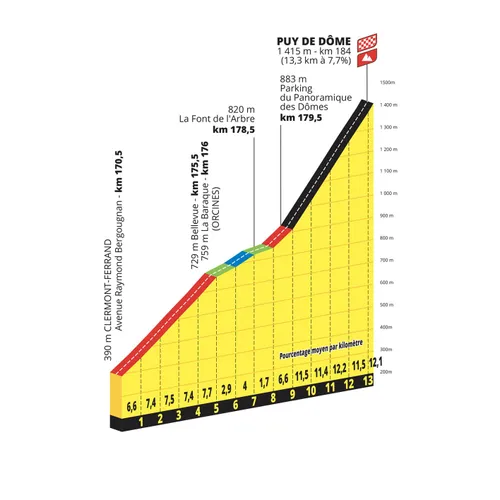
Puy de Dôme: 13.3Km; 7.7%
Read also
Stage 10: Vulcania - Issoire, 167.6 kilometers

Stage 10: Vulcania - Issoire, 167.6 kilometers
After the first rest day of the Tour de France, the peloton will have a hilly day through the Massif Central. This is a textbook breakaway day, with a hilly and roller-coaster start, and several climbs throughout the day. There will be almost no flat roads throughout the day, with the final (categorized) ascent summiting with 27 kilometers to go, before a downhill finish into Issoire.
Early in the day there are two ascents, with 4.8 kilometers at 4.8% and 7.9Km at 4.8% where the breakaway should be formed. From there on thee will be two more categorized climbs and tough rolling terrain. There are 3100 meters of climbing without one meaningful ascent, the stage's decisive attack can come at any moment, however it makes sense to look towards the final ascent.
This is the climb to the Côte de la Chapelle-Marcousse. The ascent is 6.6 kilometers long at 5.5% and summits with 28.5 kilometers to go. The climb doesn't end there however but two kilometers later, but from there on the road is almost completely downhill into Issoire and a solo attack almost impossible to bring back. he last 9.5 kilometers will be flatter but with a slight downhill tilt which means the speeds will be very fast all the way into the line.
Read also
Stage 11: Clermont-Ferrand - Moulins, 179.8 kilometers
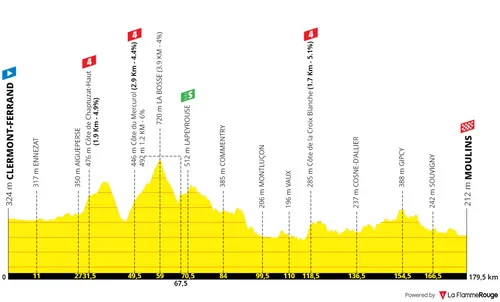
Stage 11: Clermont-Ferrand - Moulins, 179.8 kilometers
Stage 11 of the Tour de France will see a little bit of that rolling climb trend, but the start is flat, and the route into Moulins shouldn't be hard enough to prevent a bunch sprint from taking place. The stage will have two climbs early on which will make it a tad more difficult than the average day on the bike, one of the climbs being a 13.1-kilometer long climb at almost 4% average gradient.
Not one where the pace should be very high however, unless the breakaway is still being created. If so then there could be a strong group going up the road, the roads that follow won't ever be pan-flat, it's a rolling day in the Massif Central. There is a 1.7-kilometer hilltop at 5.1% which then summits with 61 kilometers to go.
The last 25 kilometers will be easier, with a bit of descending, it will be a fast run-up into town. The finale won't be too technical too, there isn't any corner where the riders will really have to break, there's a bridge crossing with 2 kilometers to go and then the finishing straight is 1.1 kilometers long.
Read also
Stage 12: Roanne - Belleville-en-Beaujolais, 169.3 kilometers
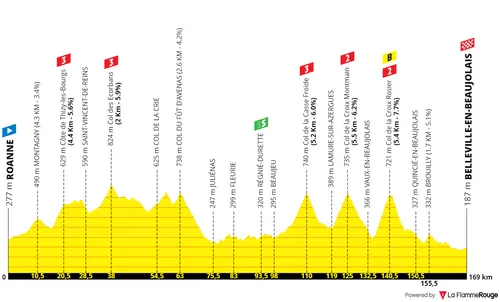
Stage 12: Roanne - Belleville-en-Beaujolais, 169.3 kilometers
Stage 12 of the Tour de France is another day for the breakaway specialists. Climbers, puncheurs, time-trialists and classics specialists will come together on this day to pursuit the win on a day that is very difficult to predict. Whilst the rolling start will be quite complicated, the treble of ascents towards the finale in Belleville-en-Beaujolais will make it quite selective.
The first 63 kilometers have six climbs, none too hard, but definitely hard enough to see a group get away. There are two blocks of climbs here, it will certainly be an explosive start to the day and very open, many types of riders can make it through. A descent and flat section follows before the combo of climbs where the stage should be decided.
The first of the climbs is the Col de la Casse Froide which is 5.2 kilometers at 6% and summits with 59 kilometers to go. Then follows the Col de la Croix Montmain which is 5.5 kilometers at 6.2% which ends with 44 kilometers to go, and then finally the Col de la Croix Rosier which is the toughest of the three, 5.4 kilometers at 7.7% which ends with 28.5 kilometers to go.
All three climbs are not overly hard. They can see decisive attacks, and although the kilometers that follow include a lot of descent, going away alone does not guarantee a win. Attacks can happen early on, but there is also the option that some riders will wait for the last of the climbs to really go all-out.
The descent is slightly technical, there is then a small hilltop which ends with 14.5 kilometers to go, but then the last kilometers of the stage are more straightforward and the riders will have a trip through Belleville-en-Beaujolais, where they will find a flat sprint but a small finishing straight.
Read also
Stage 13: Châtillon-sur-Chalaronne - Grand Colombier, 138.3 kilometers
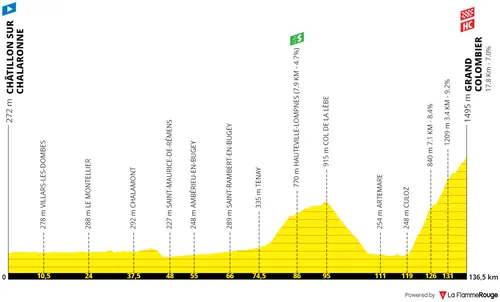
Stage 13: Châtillon-sue-Chalaronne - Grand Colombier, 138.3 kilometers
Stage 13 of the Tour de France will see the return of a colossal mountain. The queen of the Jura mountains, the Grand Colombier will host the finale of what is a very short day with a pan-flat start and little climbing beforehad. A short day on the bike, the whole first 75 kilometers are very simple and will pass quite fast.
The riders then go over the Col de la Lèbe, it is 17 kilometers long but the second half essentially a false flat, the whole ascent averaging around 3%. The riders do face a steeper descent which leads the riders into the final 29 kilometers. The riders pass through Culoz and then start the ascent, passing by the Lacets du Grand Colombier, one of the most scenic spots in the Alps.
It will all come down to the climb, which features 17.4 kilometers at 7.1%, featuring many switchbacks, some gradient inconsistencies and a steep finale to kick off the second block of mountain stages. The ascent is hard from the start, it features a few restbite sections but with 7% average gradient, it's quite telling that the tough uphill sections frequently go above 10%.
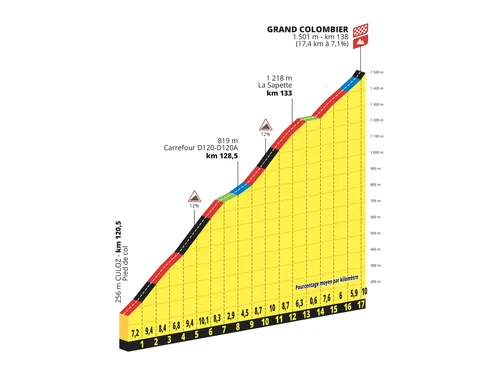
Grand Colombier: 17.4Km; 7.1%
Read also
Stage 14: Annemasse - Morzine, 152.5 kilometers

Stage 14: Annemasse - Morzine Les Portes du Soleil, 152.5 kilometers
Stage 14 of the Tour de France will be one of the hardest stages of the race, featuring four ascents early in the day where the race will stabilize. It is another short stage, but one where differences can be made. The start of the stage features three categorized climbs with 4.4Km at 4.6%, 7.1Km at 7.4% and 5.9Km at 7.7%. The intermediate sprint is then also atop the Col de Jambaz which is 6.5Km at 3.8%. A proper day of constant up and down.
The Col de la Ramaz (13.9 kilometers; 7.1%) will be a warm-up to the final climb of the day. It's a really tough one, not as constant as the final one but it features harsher gradients in some phases. This climb will summit with 50.5 kilometers to go, the descent that follows is steep. Then come almost exactly 10 kilometers before the final ascent of the day.
This will be the Col de Joux Plane (11.6 kilometers; 8.5%), before a descent into Morzine. This is a traditional Tour finale, one that frequently sees no differences between the favourites, but the stage provides the opportunity to create them. The climb is quite constant, it's steep and comes at the end of a hard mountain day. It has everything in theory to make big things out of it.
There is a small plateau section before the descent, which will be rather steep and technical, another tense challenge before the final kilometer inside Morzine, where the finale will be narrow and on some slight uphill gradients.
Read also
Stage 15: Les Gets - Saint-Gervais Mont Blanc, 180.1 kilometers

Stage 15: Les Gets Les Portes du Soleil - Saint-Gervais Mont-Blanc (Le Betex), 180.1 kilometers
The final day of the second week of the Tour de France will be another explosive Alpine day. A longer one, it starts in Les Gets Les Portes du Soleil with a small uphill. It will be an explosive day, the start rather uncertain, the 4500 meters of climbing on the day and the breakaway could go off in the Col des Fleures which is 8.9 kilometers at 4.6%. There will be the 1st category Col de la Forclaz de Montmain which is 7.2Km at 7.4% and will set some more damage in the field.
It won't be as tough of a start, but the middle of the stage will be very complicated, specially with the presence of the Col de la Croix Fry (11.3Km; 7%), this ascent summits with 55 kilometers to go, the climb features very tough gradients and will be hard to get through. Directly after the summit is a short descent and then the Col des Aravis which is 4.4 kilometers long at 6.2%.
The action should be saved towards the end however. Straight from a steep descent the riders enter the steep Côte des Amerands, 2.7 kilometers at 10.1% which summit with only 10 kilometers to go. A very short descent sees the riders in the center of Saint-Gervais-les-Bains where they'll start the final ascent to Le Betex, 7.2 kilometers at 7.7% which will make for an explosive finale.
A slight transition phase will follow, two descents separated by a plateau. both are very technical. Back in 2016 Romain Bardet and AG2R took advantage of it to split the peloton before the final climb itself. The climb to Le Bettex will be hard, and explosive. The first kilometers (with a GPS error in the profile below) average 10% for 2.7 kilometers.
There is a small descent and then follows the final uphill, this will be 7.7 kilometers at 7% including many switchbacks, an explosive ascent. The final ramp will be steep, differences can be created here in what is the final day of the second week.
Read also
Stage 16 (ITT): Passy - Combloux, 22.4 kilometers

Stage 16 (ITT): Passy - Combloux, 22.4 kilometers
The first day of the final week of the Tour de France and one which everyone has talked about. The only individual time-trial of the 2023 Tour de France, featuring only 22 kilometers in distance. Early on in the effort the riders will climb the Côte des Soudans (1.3Km; 8.8%) and descend back into the valley. The intermediate point will be at 6.5 kilometers, the descent will be fast and not really technical, high speeds will be reached.
This will be a day for the GC riders once again, and the differences will be important. The riders will climb the Côte de Domancy (2.7Km; 8.9%) that finishes with only 3.5 kilometers away from the finish, and continue on an uphill drag into Combloux where they will meet the finish line. The climb in reality is 6.3 kilometers at 6.6%, the TT will suit the climbers and GC riders, with intermediate points at the base and top of Domancy.
Read also
Stage 17: Saint-Gervais Mont Blanc - Courchevel, 166.4 kilometers
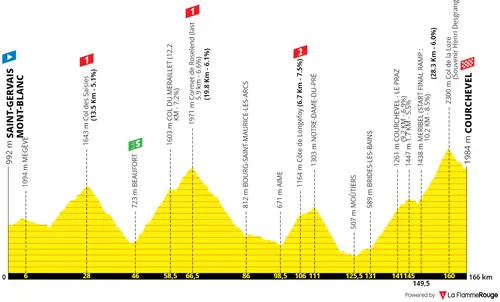
Stage 17: Saint-Gervais Mont Blanc - Courchevel, 166.4 kilometers
Stage 17 of the Tour de France is perhaps the queen stage of the race. A brutal day in the mountains featuring 5400 meters of climbing. The start is rather flat, but features in it's early parts the Col des Saisies (13.3Km; 5.3%). It will take a few kilometers for the riders to reach it, but the breakaway certainly will go up the road here.
This could very well be considered the queen stage, it's the stage that features the most climbing meters and what is considered the toughest (and highest) ascent of the race. The Cormet de Roseland (19.9Km; 6.1%) follows, a long climb with it's summit at almost 2000 meters of altitude and summiting with 99.5 kilometers to go.
Afterwards the riders will ascent the Côte de Longefroy (6.6Km; 7.5), but all of that will be a warm-up to the final ascent. The descent is extremely technical, although it may be considered the "easiest" climb of the day, the race to the summit will be real as all riders will want to be in the front for it.
After a valley run the riders will ascend to the outside of Courchevel, climbing around 14 kilometers at 6% before a small flat section. The final 10.2 kilometers have 8.5% average gradient and will take the riders all the way up to the Col de la Loze at 2304 meters of altitude, and gradients of up to 20% near the finish. It is similar but not the exact same climb that was ridden in 2020, the difference being it's earlier. It will host the Souvenir Henri Desgrange at the summit, an horrific ascent.
The summit will be placd 6.5 kilometers away from the finish, with a short descent which will be fast leading to the Courchevel altiport, still with a hilltop finish that will see ramps of up to 18% on the road. Big gaps won't be made there, but certainly some seconds could be gained or lost, as well as making for a very scenic finale.
Read also
Stage 18: Moûtiers - Bourg-en-Bresse, 185.4 kilometers

Stage 18: Môutiers - Bourg-en-Bresse, 185.4 kilometers
Stage 18 will see the riders say goodbye to the Alps. They'll be heading north, and a stage between Môutiers and Bourg-en-Bresse will be a reward for the sprinters who got through the main mountains of the race.
The day is rather simple and without too much to analyze. There are a few hilltops in the middle section of the stage, however none are too difficult and should see the teams pushing the pace. The final 80 kilometers are flat, without any meaningful ascent.
It will all come down to the sprint. There will be roundabouts with 4.7, 3.3 and 2.6 kilometers to go. It will be fast into the 1.5-kilometer mark where there will be a sharp left hander, around the 1 kilometer mark the riders turn right slightly, the final 800 meters will be the final straight on flat roads.
Read also
Stage 19: Moirans-en-Montagne - Poligny, 173.4 kilometers
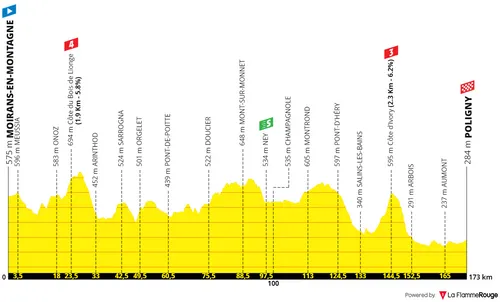
Stage 19: Moirans-en-Montagne - Poligny, 173.4 kilometers
Stage 19 of the Tour de France will be a rolling and tricky day. On paper one for the sprinters, however there is space to surprise on what is one of the final days of racing, specially as the start is hilly, there are a few hilltops and at this point in the race many riders may want to attack.
The riders will face the Côte d'Ivory (2.3 kilometers; 6.2%) less than 30 kilometers of the finish line where some sprinters may find difficulties. It isn't a tough climb but there sure is the space to make some damage, the climbs is then followed by a fast descent and the run-up to the line.
This will be the most simple one of the entire race. No technical features whatsoever, the final few kilometers are completely straightforward and will provide no challenge to the riders, it will all be up to positioning and timing. The final kilometers will have a slight uphill tilt into Poligny.
Read also
Stage 20: Belfort - Le Markstein, 133.5 kilometers
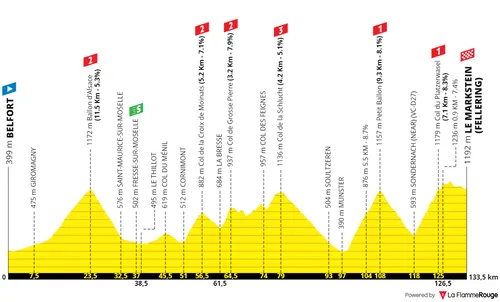
Stage 20: Belfort - Le Markstein, 133.5 kilometers
The final mountain stage of the Tour de France takes the riders into the Vosges for a short but very explosive day. The race is not over yet, and a lot can be done in these 133 kilometers which feature 3400 meter of climbing, in the terrain that decided the Tour de France Femmes last year. The Vosges are the final mountain range to be tackled and this difference in terrain could be race changing.
The Ballon d'Alsace (11.5 kilometers, 5.3%) will open things up for the day, and the middle section of the stage will see several hilltops and descents, hard terrain to control. It will all lead to a final combination of climbs however. The ascents summits with 110 kilometers to go, it's the first of many.
There will then be four hilltops, three categorized, but fatigue will build up throughout these, and attacks may come. The toughest of which is the Col de la Croix de Moinats which is 5.2 kilometers at 7.9%. This will however be largely a transition section.
The stage is to be decided on the final two climbs. Petit Ballon (9.3Km; 8.1%) will provide terrain to attack seriously, summiting with only 24.5 kilometers to go. It is steep and has the distance, the final climb is not harder and being the final opportunity, serious moves may come here.
The riders will only have a very short and fast descent before the final climb of the race which is the Col du Platzerwasel, 7.1 kilometers at 8.4% which summit very close to the finish at Le Markstein, to conclude the battle for the yellow jersey. The summit of the climb comes with 7 kilometers to go, from there on the riders follow a plateau into the finish.
Read also
Stage 21: Saint-Quentin-en-Yvelines - Paris Champs-Élysées, 114.8 kilometers
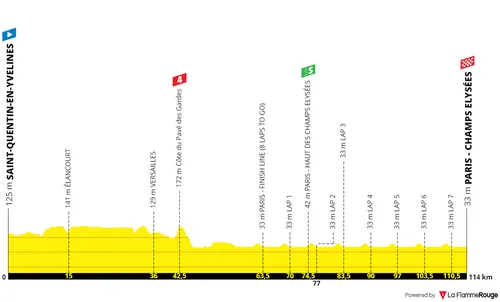
Stage 21: Saint-Quentin-en-Yvelines - Paris, 114.8 kilometers
The final day of the Tour de France, at long last. Short, flat and with sight on the Champs-Élysées where the riders will finish the Tour de France. The start will take place in the velodrome of Saint-Quentin-en-Yvelines which hosted the 2022 Track World Championships.
The finale is what we know it to be every single year. An iconic moment, the final roads the Tour will race through. It is not the easiest of sprints, with the final chicane coming with 350 meters to go, and the Champs-Elysées featuring some smooth cobbles which comes as a bit different of a sprint.
Read also
claps 0visitors 0
Just in
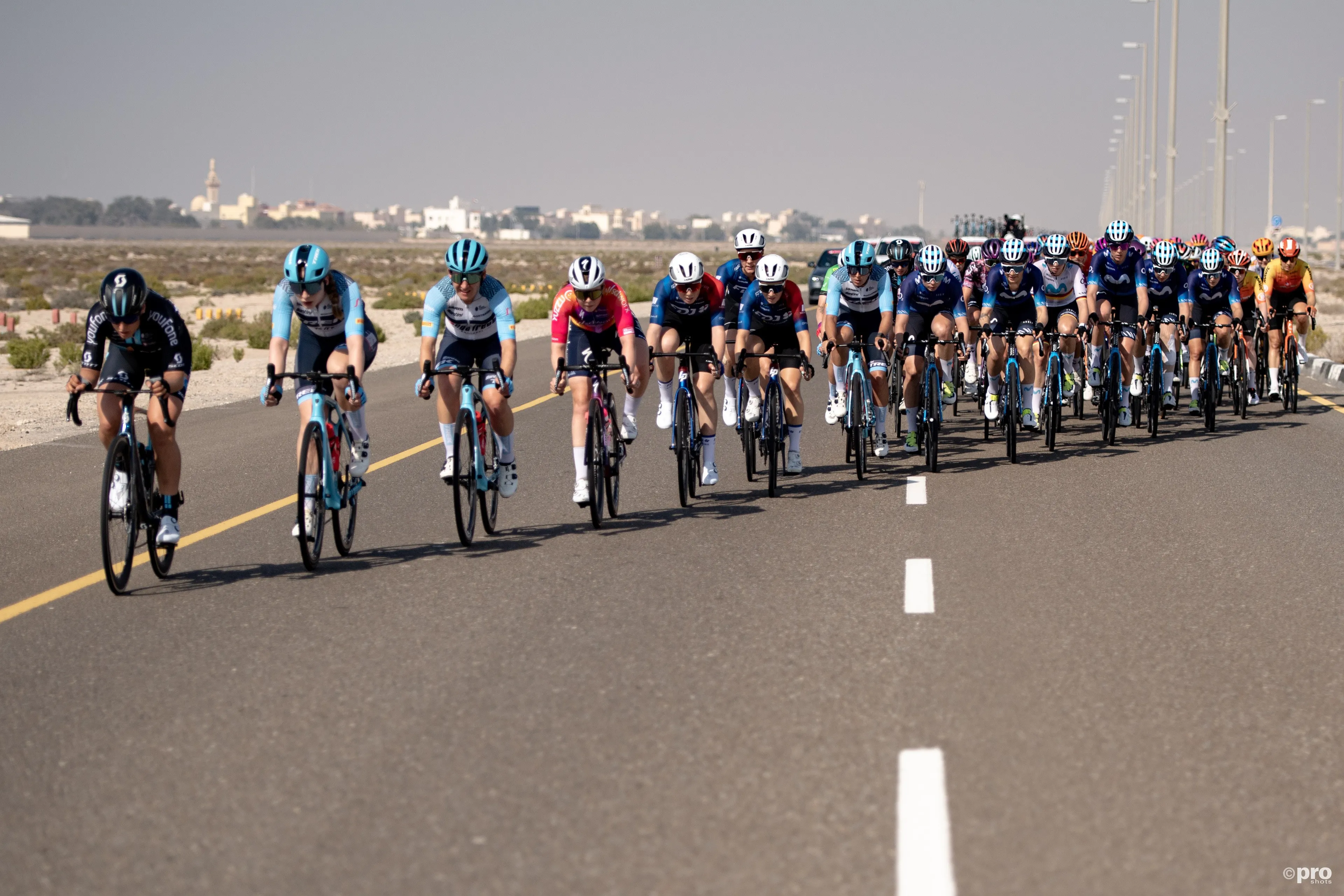
UAE Tour 2026 Jury & Fines
Feb 16, 16:29
0
Popular news
Latest comments
- Where's the national jersey?antipodeanpedalfan16-02-2026
- Pog has been flooring it most of the winter, big ride Xmas day, col de rates kom etc.. he is the man to beat! Least Tom was the only guy to hold the wheel last year 💪
 leedorney16-02-2026
leedorney16-02-2026 - Methinks the lady doth protest too much.antipodeanpedalfan16-02-2026
- and some people don’t believe in implicit biasOCexile15-02-2026
- I think that’s a good strategy. Talk is cheap. Go out there and prove you can beat Pogacar.PogiFan2Day15-02-2026
- so sad, prayers for his familymij15-02-2026
- The mistake you make is making this causal. There’s no way to know what would have happened without a vaccine. That’s why medical research is really really hard and anecdotes like yours carry little weight. (Speaking here as a researcher, so let’s just not have a debate you’re going to lose, thankyouverymuch.)RidesHills15-02-2026
- Pidcock was the only one to put the fight to Pogacar last year and probably learned along the way. Who knows. I always assume Pogacar will win, but sometimes no, and that makes for great racing moments.RidesHills15-02-2026
- really really difficult to rule on, but my first thought watching the race is moves like that while possibly “legal” because he was pedaling, need to get a multi day suspension, as it was a direct effort to become an dangerous obstacle.jad2915-02-2026
- I'm always rooting for Pogi, but at the same time so happy he's on UAE.Mou-Cro-HR15-02-2026
Loading
Write a comment


